Isham Cook's Blog: Isham Cook
August 10, 2025
The Tao of Poison. A novel.

A poisonous maiden, a Daoist sex cult, and a violent anti-government rebellion.
Polyandry—one or more males moving in and sharing the wife’s bed with her husband’s consent in exchange for money or labor—was common among the impoverished in Imperial China, though illegal, and the polyandrous Yan family in rural Shaanxi Province take in two carpenter brothers. When one brother is convicted of murder after killing their neighbor in a dispute, a constable threatens to expose the family’s rumored polyandry and extorts sex from their beautiful 17-year-old daughter, Qiezi. Having grown up in the mountains, Qiezi has a preternatural knowledge of botanical medicines. She’s also addicted to the psychoactive, poisonous datura flower, and the toxins in her system are fatal to the constable. Now on the run as a murder suspect, she leaves a trail of sexual carnage wherever she goes. But a larger cataclysm awaits her when she gets caught up in the White Lotus Rebellion (1796-1804), which caused the deaths of 200,000 rebels, government troops, and civilians. Picaresque action, dark humor, and irony unfold in this visceral and cinematic novel.
Historical note: The Tao of Poison is extensively researched, including the author’s own travels to the scene of the rebellion in the Hubei-Shaanxi-Sichuan region to soak in the environment. Several novels have been published on the much better-documented Taiping Rebellion (1850-64) in China. This is the only novel in English on the White Lotus Rebellion. The sole Chinese novel on the rebellion, Wang Zhanjun’s The White-Clad Warrioress [Baiyi Xianü] (1982), was not used as a basis for The Tao of Poison. My inspirational model would have to be Patrick Süskind’s Perfume.
TABLE OF CONTENTS:
Chapter 1: The poison maiden
Chapter 2: The haunted pagoda
Chapter 3: The bath
Chapter 4: The nunnery
Chapter 5: Purple Cloud Palace
Chapter 6: The obscene temple
Chapter 7: The Magu goddess
Chapter 8: The apothecary shop
Chapter 9: The inquest
Chapter 10: The bandits
Chapter 11: The executioner
Chapter 12: The ring of fire
BUY THE BOOK:

Amazon paperback
Amazon Kindle
Link to bibliography of research for The Tao of Poison
* * *
MORE FICTION BY ISHAM COOK:
Lust & Philosophy. A novel
The Exact Unknown and Other Tales of Modern China
The Kitchens of Canton. A novel
The Mustachioed Woman of Shanghai. A novel
October 10, 2023
“The golden ocean flower.” Fiction

[For background to this story, read the preceding story “Qiezi.”]
A cleaver and a silver tael given to her by her father were all that weighed down the sack hanging from her shoulders as Qiezi forded the river. Now on the opposite bank on agile feet she scarcely needed to halt her pace except that she was hungry, the family meal aborted by the unfortunate events of the past hour. Expressionless yet alert, darting like a cat, she stopped and squatted to turn over the undersides of rocks and logs for termites and grasshopper and darkling beetle larvae to place on her tongue. They would do for now and she washed it all down with sweet osmanthus flowers and dandelions, stems and all, and river water from cupped hands. The sustenance glowed inside her and she got her energy back. As it grew dark, she slowed her pace and listened. The forest was almost cacophonous in its myriad sounds. The way she angled her head suggested they appeared to her as images positioned in a three-dimensional ink painting, with darker strokes in the foreground and lighter strokes in the background. There were no human figures in the painting; had there been, she would have removed them by repositioning the painting.
Her knowledge of the territory quickly brought her to where she wanted to go, a familiar clump of bamboo stalks. They ranged from her upper arms to her calves in diameter and she felled the thickest of them, wielding her cleaver like an ax with a few blows on either side. Hacking the tops away and shaving off the branches, she worked from memory, reconstructing what she had observed on the river.
She must have felt fortunate indeed even to be able to observe anything on the river, for she was the only grown girl in the village allowed to wander alone, the only woman apart from her mother who was physically capable of wandering alone rather than carried on someone’s back or hobbling along with a cane. Those villagers who hissed and snickered at her ugly “duck feet” wouldn’t last a day out here alone. Had she had a normal upbringing, I expect her mother had told her, she might have been of some use married off to a wealthy man. With proper lotus feet, she could have driven him to ecstasy by removing her bandages and letting him smell her odiferous stubs as he washed and caressed them in rose water, or not even wash them before taking them one by one into his mouth, like the male actors in opera troupes are rumored to do with each other’s members, and then stick that long big toe of yours into his filthy hole so he could be taken like a woman, a pleasure more delirious than taking a woman and available only to wealthy men. That’s the only good thing lotus feet are for and that’s how you might have been of some use. As for the other village girls, their lotus feet would find no male orifices to work their way into, no purpose apart from the brutal one everyone understood but never acknowledged: to keep you and your broken feet bound to the spinning wheel and the loom. How lucky you and I are to be mountain women!
Having lined up enough poles on the ground to match in length her height with arms extended and half as much in width, Qiezi lay down exhausted and fell asleep, cleaver in hand.
In the morning she dragged the poles down to the riverbank and lined them up flush, the straightest in the middle. From the soil along the eroded bank she pulled out the long thin roots of a pine tree and used these to tie two short bamboo poles crosswise to the parallel ones, looping them over and through and yoking them together as tightly as she could, into the semblance of a raft, if only it would work. Hooking it to a thick tree root with more root cord, she pushed the raft into the water. It floated. She tried climbing aboard but it tilted and she fell off. When she managed to board it, her weight submerged the raft below the water. She needed more poles, more tightening, more work, but her hands were numb and bruised. She foraged again for sustenance and rested. The day was already spent. The overcast sky would soon shroud her in pitch darkness, preventing travel down the river in any case. It would have to wait for moonlight.
The next day she cut two more lengths of bamboo stalk and added one to each side of the raft, while loosening the cords and readjusting the poles to fit yet closer together. It could not but work this time. The sky was clear and the moon was out. She got on the raft, but what she had not counted on was the extra weight from her sack, as light as it was, and the steering pole. The raft held—just below the water’s surface. She cursed and gazed back toward the bamboo grove. Further widening the raft meant another day’s work—and lost time. Grimly she stared ahead and pushed off anyway.
The current was strong enough to move her along at a good pace. But it also caused her to turn in circles and get stuck along the banks. She got better at controlling the raft with practice but steering it was even harder than building it! Her arms were about to give out when she discovered she could zigzag down the river by letting the raft drift until the bank loomed up and then pushing off again. After several hours, a drumbeat in the distance signaled the start of the fifth watch. She was approaching the walled town: the danger zone. It’s unlikely the nightwatchman and his lantern would notice anything but that possibility had to be minimized. As she approached the bend of the river and the dock just beyond, she aimed toward the river’s far side, placed the steering pole beside her and lay back flat on the raft, half in the water. No frightful voice called out and she coursed past.
In a few hours it would be dawn. Sleep was out of the question. She had to keep an eye on the raft. There was also the matter of where to ditch it. Traveling in daytime made her visible. On the other hand, the further she went the more anonymous she would be. But she was also in unfamiliar territory. At some point she would have to make her way among people who didn’t know her. She would be no less safe than if they did know her, given general hostility toward the unheard-of phenomenon of a young woman traveling alone. There would be only one recourse, to patch together a robe and shave her head to look like a Buddhist nun. She must have been wondering about her parents, who were escaping south on foot and should already have made it into Sichuan by now. They knew people there and would manage. She would manage. But as prepared as she was for surviving alone, she was nonetheless still in shock, a stunned creature drifting on a raft.
The dawn brought mist and shrouded the river. She heard voices but couldn’t see them and they were looming up. A man screamed. “Look, she’s floating on the water,” he said. “It’s a ghost, gliding on the water!”
“No, it’s not a ghost, you idiot,” said another. “She’s pushing a raft. See, it’s just under the water. She’s sitting on a raft.”
Their sampan came into view. “Who are you?” they said.
“Who are you?” said Qiezi.
“Your raft isn’t holding up. You need help. Here, we’ll help you.”
“No, I can manage.”
“You made this raft yourself? It won’t last another hour.”
“I’ve been on it since yesterday.”
“It won’t last, I’m telling you,” said the first man. He was young and stared at her open-mouthed.
The other man looked several decades older and was bearded and his hair had a Taoist topknot. “Where are you going?” he said.
“Ankang.”
“Ankang, in that? You’ll never make it! The river widens up ahead and you’ll flounder and drown.”
“You know the area?”
“Of course. We live here.”
“I need to find a place to stop off and rest.”
“Come on our boat and join us. Just let the raft go. It’s useless.”
“No, it’s my raft.”
“Let her hitch it to the boat,” said the elder. “Come in the boat and dry off. You’ll get sick in the water like that. Are you hungry?”
“Yeah.”
“Get her some fish cakes.”
“Thanks. I need to get to Ankang.”
“We can take you halfway there. To Flowing Water. From there you can keep going downriver or go by land.”
“How far to Flowing Water?”
“About a day.”
“Overnight?”
“Yes. You can sleep with us,” said the younger.
“Don’t frighten her. He means you can use our mat. We’ll leave you alone. You can rest now if you want. We’re busy fishing.”
“I don’t want to get off in the town. Is there another place you can drop me?”
The elder laughed. “Of course, such a beautiful girl alone in public isn’t safe. But how can you survive all by yourself?”
“I’m from the mountains,” she said between bites of fish cake.
“A mountain girl. What’s your name?” said the younger.
“Mantuoluo.”
“Mantuoluo. What kind of name is that? A tribal name?”
“Yeah.”
“I thought so. Your dark complexion. And your unbound feet. Are you Miao? From Sichuan?”
“Yeah.”
“What are you doing alone?”
“That’s my business.”
“Family trouble, I bet,” said the elder.
“We can take her to the pagoda.”
“What pagoda?”
“There’s an old abandoned pagoda on the way to Flowing Water. You can shelter there.”
“That sounds good.”
“You look exhausted. Lie down under the shelter and rest. We should reach the pagoda before the first watch this evening,” said the elder.
“You sure I’m not taking you out of your way?”
“No. We cover this whole area.”
Qiezi curled up on the dirty straw mat, her sack hooked through her arm, and fell instantly to sleep.
She had been out for who knows how long when singing startled her from her slumber. She looked around in confusion. The sun was on the other side of the sky; she had drifted off for most of the day. The younger was humming a tune.
“Oh, she’s awake,” said the elder.
The younger turned to her and sang:
When the beauty was here, flowers filled the hall.
Now the beautiful woman’s gone, the bed lies empty;
Only the rolled-up embroidered quilt sleeps there.
It’s now three years and I can still smell her scent:
A scent departed yet still lingering,
A woman departed yet not returning.
Yearning yellows the falling leaf,
White dew beads the green moss.
“What are you singing?”
“A poem, called ‘Long Yearning.’ Haven’t you heard of it? You must know it. It’s by Li Bai, the famous poet from the Tang Dynasty.”
“How would I know that?”
“You don’t know any poetry?”
“Of course, she doesn’t know any poetry,” said the elder. “What mountain girl can read?”
“I can read.”
“How can you read? I can’t even read,” said the younger.
“How do you know poetry then?”
He tapped his head. “It’s all in here. Memorized. I hear poems and remember them.”
“Where did you learn to read?” the elder asked Qiezi.
“The apothecary taught me. But he didn’t teach me poetry.”
“Really.”
“You must be very smart,” she told the younger.
“I can’t read and even I know poetry,” said the younger. “But you can read and you don’t know any poetry. I can teach you. Here’s another poem. It was written by the Huizong Emperor in the Song Dynasty for his concubine:
Drinking wine together in the glow of the nephrite lamp,
I think back on our embrace, it felt so good. But it hurt, oh it hurt.
I gently pushed him away.
The younger grew more animated as he spoke, mimicking the lines with bodily gestures:
Now I hear him tremble and I blush with shock.
We thrust up against each other.
We become crazy, together as one, arms clasping, lips meeting, tongues entwining.
“I don’t understand,” said Qiezi.
“That isn’t poetry,” chuckled the elder.
“Fuck your mother. It’s a famous poem! Now here, let me demonstrate it. Stand up. I’ll recite it again and show you.” The younger embraced her. “Now push me away when I say, ‘I gently pushed him away.’”
Qiezi pushed him away. The younger pretended to tremble and shudder, rubbing and grabbing his groin. He then threw his arms around her and tried to kiss her. As Qiezi repelled him again he grabbed her shirt and her breasts slipped out.
“What are you doing!” she gasped, pulling her shirt down.
“You’re not playing your part! You have to continue. You have to kiss me with your tongue,” he said.
“Who says I want to play your part?”
“He’s just playing with you,” said the elder. “Relax.”
“Yeah, don’t worry,” the younger said with a laugh, sitting down. “I’m just joking with you.”
“You’ve both been drinking.”
“Here, have some spirits,” said the elder, handing Qiezi his bowl.
Squatting with them, she took a sip. “That was very rude of you,” she said to the younger. “Don’t do that again.”
“What? Now, hold on. You’re telling us what to do? After rescuing and feeding you?” yelled the younger, standing up.
“That’s not the way to behave toward a young lady, raising your voice like that,” said the elder. “Use gentle words.” He went back to gutting the fish they had snagged. “Just play along with him. Though of course, he does have a point. You should show some appreciation for our generosity,” he continued, running the blade of his cleaver along her shirt, splitting the seam and opening it along the side. “These rags of yours are barely holding up. You need a new set of clothes.”
“They’re all I have,” she said, holding her shirt in place.
“What did we just tell you about showing some appreciation? Take your hand away!” said the younger, ripping Qiezi’s shirt open. He also had a cleaver—hers, she realized, taken from her sack.
“We’ll get you a new shirt back in town if you stay with us. And these pants too,” said the elder as he hooked the edge of the cleaver under her sash.
“Please don’t cut my sash. I’ll take it off.”
“Let us help you.” The elder proceeded to sever her sash and pull her pants down off her hips, before tossing her clothes in the water, along with her sandals. “You won’t be needing these anymore. Now that’s more like it. A wild mountain girl in her natural state.”
The younger was already leaning back under the shelter with his pants down. Qiezi removed a fresh bloody tube from between her legs, squatted over him and the elder in turn. When they were finished, they told her to stay put under the shelter.
“When will we reach the pagoda?” she asked.
“Who said you’re going to the pagoda?” said the elder. “Don’t you want your new set of clothes?”
“Can’t you just let me off at the pagoda?”
“Can’t you just shut up?”
“You said you would. I’ve been cooperating with you.”
“She’s starting to get annoying,” said the younger. “You’ll be lucky if you make it as far as the pagoda. Should we tell her?”
“Tell her what?” said the elder.
“You know, that we have to kill her.”
“That’s hardly been decided. We may have some use for her. At least until tomorrow.”
“I want to be of use to you. I can cook for you. I can gather all kinds of vegetables and herbs.”
“Who asked your opinion?” said the younger, slapping Qiezi in the face. “She’s already a nuisance—a dangerous one. We’d better kill her now.”
“I’ll scream.”
“So what? No one will hear you.”
“Someone surely will. It’s only early evening. My body will be discovered downstream and you’ll be prime suspects when you dock.”
“She can’t be seen with us on the river,” said the younger.
“That’s only a problem in the daytime,” said the elder. “I’d like to have another go at her tonight. Such a precious creature. We’re not going to find the likes of her again.”
“Why don’t you take me to the pagoda and leave me there? You can tie me up so I won’t escape. You can do anything you want with me.”
“I told you to shut up!” said the younger.
“Keep your voice down. People may hear us,” the elder admonished him. “Let’s keep her for a few hours while I think about what to do. No more word from you,” he warned Qiezi, pointing the cleaver at her, while the younger guarded the other side of the shelter. “Or we’ll send you and your raft adrift after slitting your throat.”
“I’m not going to cause any trouble—”
“Didn’t we just tell you to shut up?”
“Yes, you did. But I’m not afraid of you. Let me join you. As a fisherwoman. I want to learn about that. I can teach you about foraging.”
“Hold it!” said the elder. The younger was about to strike Qiezi with the cleaver. “Not one more word out of both of you! Take the pole and steer for a while. But go slowly,” he told him.
The sampan hovered on the water as darkness gathered.
“Here, you take the pole. I’m feeling tired.” As the younger reached over to hand the elder his pole, he tripped and fell.
“What’s the matter with you?”
“I don’t know. I feel sort of dizzy.”
“I don’t feel very good myself. Was that a bad batch of fish cakes?”
“They’ve been okay until now.”
“I don’t have any more strength either. Let’s lay low and tie up the boat at that bank over there.”
The two men stayed where they were, immobilized.
“Let me help you,” said Qiezi, taking the pole herself and stepping onto her raft.
“Get back under the shelter, if you don’t want us to kill you.”
“I think it’s the other way around.”
“Whadd’ya mean?” said the younger, lifting up his head from the floor of the boat, his speech slurred.
“You should be grateful you have someone to bury you.”
“What are you talking about? Who are you?”
“You wouldn’t understand.”
“What’s happening to us?”
“You were right, she’s a ghost,” said the elder. “Where are you taking us?”
“To the pagoda.”
“No! It’s haunted! Take us to the Buddhist temple.”
“Where is that?” said Qiezi.
“Ten li further downstream. This side of the river. You can see it through the trees. Help us!”
“You won’t make it that far,” she said to him.
The elder’s eyes widened in shock. “You’re a spirit from the haunted pagoda!”
He crawled after her with the cleaver. Qiezi knocked it out of his hand with the steering pole, sending it into the water. He flopped onto the raft and drowned, his face in the water. This forced her off the raft and into the water. She climbed onto the sampan, smacking the younger on the head with the pole until he released his grip on her leg.
He continued to moan incoherently as the naked girl pushed down the river looking for the pagoda. By the time she spotted it, he was silent.
Qiezi lashed the raft and the sampan to a tree by the riverbank and gathered the remaining fish cakes and cleaver. The elder’s body was the heaviest and it took all her effort to drag him up the footpath and into the pagoda. The younger’s body was lighter, but as she pulled him over the sampan’s edge she slipped and cut her foot on a sharp rock in the water. Her foot bleeding profusely, she managed to get the second body into the pagoda. She went back down to the water to clean her foot, grabbed two more items, the steering pole and the elder’s flask of spirts, and dragged herself back to the pagoda, careful not to soil the gash. She then stripped the corpses of their clothes. The younger’s she wore. The elder’s she spread out on the stone floor to lay on, while tearing off a strip to tighten around her injury to staunch the bleeding. Her back to the wall, she poured the strong spirits on the wound and waited for the bleeding to stop, gobbled down the remaining fish cakes, and sobbed herself to sleep after the long day.
In the morning, she hunted for medicines. She was looking for the three-to-seven-years plant, so named for the time it took to mature, shavings from whose ginseng-like root placed on the wound would heal it fastest. This was not at hand, so the more abundant crow’s head would have to do, whose purple-hooded petal resembled the prepuce over her own yin button. It was so poisonous she had to grab it by another plant’s leaf to avoid contact with her fingers; lightly as a feather she passed it over her gash. As there was no time to weave a new pair of sandles—both men had been barefoot—she grabbed several taro leaves as big as lotus leaves, wrapped them around her foot and secured them with root string. Now a bit more ambulatory, using her bamboo pole as support, she looked around for more essentials, one in particular, her loadstone the golden ocean flower, needed to keep her mind clear; the last of her supply had been hastily tossed off the sampan. If she could find the yellow celestial seeds flower with its eerie blood-red veins or the human-shaped root of the even rarer mandela flower, which itinerant doctors sold at outrageous prices, they would also serve, but none did she see.
Back at the river, Qiezi got in the sampan after separating it from the raft and headed downstream. Soon she ran into another pair of fishermen, haggard-faced types who drew up alongside her, dispensed with niceties and reached over to drag her into their sampan. She slammed her cleaver down on the boat’s edge, missing a wrist but lopping off a finger. As the man squealed in pain, with a surge of energy she swung her steering pole around and smacked the other man hard on the groin, and pushed off against their boat. Fired by adrenaline, she sped through the water. Their sampan stayed away. Eventually she spotted the temple. Securing her boat at the bank, she limped up the path.
She entered the courtyard. No one was about the modest compound. Perhaps the monks were out begging for alms, or in lunching or napping. It was early afternoon. She peered into the nearest hall. A tall young monk was sweeping. At first he waved her away. Looking more closely, he came up and stared at the strange young creature with a bamboo pole, horrid rags drooping from her and foot wrapped in leaves. “What do you want?”
“Something to eat,” said Qiezi.
“You can’t eat here. Go to the women’s monastery.”
“I’m in a bad situation. Just give me something to eat and I’ll leave. And I need a robe.”
“What happened to you?”
“I was attacked by fishermen down on the river.”
“Whose clothes are these?”
“Never mind.”
“You’re so young. I thought you were an old beggar woman. I’ll get you a bowl of soup but you can’t stay here.”
“Don’t tell anyone I’m here.”
“I have reason enough not to tell anyone. Go wait outside the gate.”
Her hands were still shaking from the latest encounter on the river as she downed the soup.
“How bad is your foot?”
“I know how to take care of it. Please, I need a robe.”
“There are no robes here for women.”
“Any robe is fine. You can see these clothes won’t do.”
“Go to the women’s monastery.”
“I have something to tell you. This has to be a secret. There are two dead men up the river. I can show you where they are.”
“Oh heavens. I’ll go summon the yamen runners and you can lead us there.”
“No. Only you.”
“Why? What—did you kill them?”
“No. I found them dead. Would I be telling you about them if I had killed them?”
“This is a matter for the yamen runners.”
“Come with me now or I’ll run away and you won’t find the bodies.”
“Are you crazy? They will be found without you and you’ll be the prime suspect. You’ll be caught before you know it, assumed guilty and tortured.”
“Come with me now. I’ll show you where they are and I’ll be gone. We can take the sampan upriver.”
“Whose sampan?”
“Get me a robe and come.”
“Are you dangerous?”
“Do I look dangerous?”
The two of them paddled upstream and tied the sampan at the bank by the pagoda.
“The haunted pagoda!” exclaimed the monk.
“You really believe that? Go up into the pagoda and wait for me. I need to wash my foot. Give me the robe. I want to change into it.”
“Don’t change here. You might be seen.”
Qiezi glanced toward the river. “Go up and wait for me.”
He stayed where he was and watched as she waded into the water and submerged herself, scrubbing her hair. What then emerged was no longer the grubby vagrant but something yet more distressing and unfamiliar to his eyes. The baggy fisherman’s clothes now clung to her like seaweed, and he saw her round hips and bulging bust, and with her disheveled hair slicked back and out of the way, the finest cheekbones, a face of classical perfection, a woman of exceptional beauty. As she lifted her arms to squeeze the excess water from her hair, her wide sleeves dipped open to expose black flames of armpit hair as obscene as anything between her legs. And as she bent down to look at her foot, he glimpsed a hanging breast and its brown nipple through the gap in her shirt.
“Let me see the wound,” he said.
“It’s not getting any worse. I’ll tear more strips from these rags to bind it. Now give me the robe.”
“You’d better change in the pagoda. It’s safer there. I’ll stand outside.”
They entered the pagoda. The monk went up to the naked corpses laid out side by side in the center of the floor; they were intact and there were no signs of mischief.
“This is where you found them?” said the monk.
“I found them in the sampan and brought them here.”
“I wonder if they were poisoned. But arsenic usually blackens the flesh. Their flesh has yellowed a bit, that’s all. How did you discover them?”
“You saw that raft down there? That’s what I was on and I found them drifting in their boat yesterday, already dead.”
“I thought you said you were attacked.”
“I was, this morning on the way to your temple. Another boat of two fishermen. I sliced off one of their fingers when they tried to rape me. I’m afraid they’re going to come back looking for me. If you ever see a fisherman with a missing finger, you’ll know it’s them. Let me change into the robe.”
“What kind of person are you, attracting so much trouble? Are you a spirit? A fox spirit? A witch? Are you real? Change here and let me confirm you are human!”
“Give me the robe.”
He was holding it to his chest and breathing heavily. He extended it to her then pulled it back before she could take it.
“Give me the robe.”
He was breathing so hoarsely he was snorting and losing the power of speech. “No!” he blurted out, more to himself than to her. Shifting his gaze from her to the floor and back to her, he flung the robe down and spread it out, tears dropping from his eyes.
“No, you’ll die!” she said. “I’ll tell you the truth. I am poisonous!”
“How can you be poisonous?”
“I poisoned those two men. That’s how they died!”
“How can you poison me? You can’t poison me. I won’t let you!”
A stronger power had taken over his limbs. He tore open her shirt, stripped her of her pants, and dragged her onto the robe.
“I’m telling you, you will die!”
A witness to this scene looking through one of the pagoda’s windows, had there been one, would have seen a streak of sunlight illuminating the ripped deltoids of a man as he folded back female legs and dug his face between them like a tiger feasting on its prey, silent but for his grunting. He mounted her and worked up to his final spasm before collapsing upon her in sleep. She kept him inside her.
He woke up sometime later. The sun was still out but dusk was gathering. “I have to go. You be out of here soon, before the yamen runners come.”
“How are you feeling?”
“Tired. Drained.”
“No, don’t leave me.”
Her legs were wrapped tightly around him, preventing him from getting up.
“Let me go. What we’ve done is shameful, terrible, and I have to return to the temple.”
“Stay with me a while.”
“What’s your name?”
“Mantuoluo.”
“Mantuoluo? The ocean flower?”
“Yes, the golden ocean flower.”
“That’s not your real name. Why did you name yourself that?”
“I need it. The ocean flower. Have you seen any around?”
“I recall seeing some purple ones, but I can’t remember where. Why do you want it? It’s poisonous.”
“Purple ones, yellow ones, white ones, they’ll all do. I need it. My body is saturated with it.”
“I don’t understand.”
“I’ve eaten the flower all my life, since I was old enough to go out and wander as a child. I almost died the first time I ate it. But it opened my eyes and I’ve never been without it. I can’t stop eating it.”
“How can that be? How can you eat a poison?”
“It’s not a poison in small amounts. It’s a medicine, and it’s magical. But I’ve eaten so much of it over the years I need more and more. I can’t die from it. I will die without it.”
“What’s magical about it?”
“The plant spirits come to life. They talk to you.”
“Let me go. I have to get back.”
Her legs were still clamped around him and her yin muscles contracted and gripped his member within. “You won’t make it. It’s too late.”
“What do you mean?”
“Let me comfort you in your last hour.”
He looked at the corpses and back at her, only now understanding, his eyes widening in horror. “You only slept with them and they died?”
“Stay with me. Love me. Can’t you feel my desire? Can’t you feel how wet I am? This is now the apex of your life, with me. Your life’s work is now complete. Appreciate it! Appreciate me!”
“Why are you doing this to me!”
“You forced me. I told you you would die. You didn’t listen.”
“You seduced me.”
“You wanted me.”
“You’re a witch!” He stood up with her still attached to him. “Get off me!”
“I am not a witch. But you’re going to die. You have to come to terms with it. You can’t run away. You’ll soon collapse. I’m sorry! Let me attend to your body here in the pagoda.”
He managed to dislodge the human-sized insect and they both fell on the floor. “No!” he shouted, breaking down in tears. “I don’t want to die.”
“I’m sorry, but that’s your fate.” She wiped the streaming perspiration off his face.
“I have to get back to the temple. I can’t be abandoned here!”
He got up. Grabbing his robe, he staggered down to the river, fell into the sampan naked and tried to push off. She went after him and watched sadly as he got nowhere. “You have to untie the boat.”
“I’m losing strength. Take me back to the temple.”
“It’s too late. If you flee in the boat, you will only drift in circles and no one will see you. Come back to the pagoda.”
At the water’s edge Qiezi sat down with knees pulled up to watch him die. As he slipped into unconsciousness, she donned his robe, grabbed the cleaver from the sampan and, using the water’s surface as a mirror, carefully shaved all the hair off her head. She had to make another trip to the pagoda to clean, dress and bandage her foot. She wrapped his body in the other robe, the one he had spread out on the floor, after washing out the blood and semen stains. With its sash she was able to cinch him up the path and into the pagoda. She placed his body next to the other two. His penis was still erect—a death erection.
Now she was a Buddhist nun, if only in appearance. She didn’t know much about the creed aside from cursory visits to temple fairs with her parents. But she knew that even bad people tended to leave nuns alone. The river was a different matter. The sight of a solitary nun in a sampan would have been so odd word would travel fast; and she had had enough dealings with fishermen. She would have to make do on injured foot; reed sandals would be made later. She still had her silver tael, cleaver, and a bowl filched from the sampan in her sack, soon fill up with edibles and medicinals gathered in the woods along the way, worn under her robe.
* * *
MORE FICTION BY ISHAM COOK:
“Qiezi.” Fiction
The Exact Unknown and Other Tales of Modern China
Lust & Philosophy. A novel
The Kitchens of Canton. A novel
The Mustachioed Woman of Shanghai. A novel
May 14, 2023
Insights into China (Part 3/3): A stay in a hotel
 A budget hotel chain in Shanghai; the scrolling text beneath advertises a discount (all photos by Isham Cook)
A budget hotel chain in Shanghai; the scrolling text beneath advertises a discount (all photos by Isham Cook)Ramshackle inns and sailor bars
The first hotel I stayed at in China was the Seagull in 1990, across the street from the famous Astor House established in 1846 (now the China Securities Museum), in the former American Concession in Shanghai. It’s been a while and the only thing I recall about the hotel is having to hand my key over to a floor attendant manning a desk in the hallway whenever leaving my room. Also in the hallway was a rack with multiple copies of a booklet translated into English on the correct interpretation of the “Tiananmen Incident” in Beijing the previous year. Stationing attendants on every floor made it difficult to smuggle unapproved guests into your room, particularly Chinese nationals of the opposite sex. But apart from these quirks, even by then China could be said to have come a long way in bringing its hotels up to minimally acceptable standards.
It had only been a few years since individual tourists from abroad, as opposed to chaperoned groups, were allowed into the country at all. In fact, travel to China for either employment or tourism purposes had petered out back at the start of World War Two under the Japanese occupation. For over fifty years, until around the time of my visit, China was a closed country.
 Seagull Hotel circa 2020, viewed from the former Astor Hotel
Seagull Hotel circa 2020, viewed from the former Astor HotelIn the four decades prior to that, going back to the turn of the twentieth century, if you were not lucky or wealthy enough to reside in the foreign concessions of Shanghai and other port cities or Beijing’s Legation Quarter, conditions in the sailor bars and the few other establishments willing to put you up would have been pretty makeshift. The film The Sand Pebbles (dir. Wise, 1966), based on Richard McKenna’s naval sojourn in 1930s China as fictionalized in his novel of the same name, gives us a vivid idea of what these conditions might have been like. Another useful eyewitness account is the writer Qian Zhongshu’s catalog of ramshackle inns in his novel A Fortress Besieged (1947) chronicling protagonist Fang Hongjian’s journey from Shanghai to a university teaching job in Hunan Province in 1937. Travel conditions at the time were hardly less primitive than in pre-modern China. The scarcity of buses and trains meant it took weeks to cover the same terrain traversed today in several hours by high-speed train, and Qian satirizes the naivety of his pampered hero and his travel companions who failed to plan ahead and bring along enough cash. The colorful details, however, derived from the author’s own experiences traveling around southern China in those same years. Qian’s acutely observed descriptions are of documentary value and thus serve as a rough baseline for assessing China’s progress in its hospitality industry over the subsequent half-century. One inn is described as follows:
The two Chinese-style, single-storied buildings in the back were divided by wooden panels into five or six bedrooms. A tent, which served as a dining room, was erected on the bare earth in the front. The hotel relied on the aroma of wine and meat, the banging of knives on pans when the food was ready, and the cries of the waiters to draw travelers in to spend the night. The electric lights inside the tent were dazzlingly bright. The bamboo and mud-plastered walls were completely pasted over with red strips of paper on which were written the names of the best dishes of the house.
Another inn also had their kitchen set up in the entrance:
The front room served as the guests’ dining room during the day and as the bedchamber of the innkeeper and his wife at night. The back room was divided into two guest rooms which were shut off from the sunlight and exposed to the wind and the rain…All around the inn was the heavy stench of urine and excrement, as though the inn were a plant for which it was the guests’ duty to provide fertilizer and irrigation. The innkeeper was frying food on the street.
In one inn, tea and rice were sold on the ground floor, while guests accessed their rooms on the second floor by a bamboo ladder. To provide an extra bed for a third guest, “the waiter placed a door plank across two unpainted wooden benches.” The beds were infested with lice and bedbugs and mice scurried over the guests in the dark. In yet another inn, they “all slept in an unpartitioned room. There were no beds, just five piles of straw. They preferred the rice straw to hotel beds, which sometimes felt like a relief map and sometimes like the chest of a tuberculosis patient.” Not all was dreary, and entertainment of a sort could be had: “The walls of most Chinese inns are very thin, and though one’s body may be in one room, it seems as though one’s ears are staying next door. As usual, the inn had blind, opium-smoking women soliciting business from room to room and inviting guests to pick numbers from Shaohsing operas for them to sing” (trans. Kelly & Mao).
If we go back further in time to the Qing Dynasty, conditions for foreign travelers fell into two phases. In the first phase (1636-1860), from the Dynasty’s outset (and long before that) until the Second Opium War, foreigners were forbidden from setting foot in the country on pain of execution. A handful of Jesuit missionaries and foreign delegations on diplomatic embassies were the sole exception. Upon the conclusion of the First Opium War in 1842, foreigners were permitted to reside in the foreign concessions of five treaty ports, Guangzhou, Xiamen, Fuzhou, Ningbo, and Shanghai. In the second phase (1860-1901), from the Second Opium War until the Boxer Rebellion, foreigners were finally allowed to travel outside of the treaty ports and into China’s interior, though travel conditions were primitive and dangerous. Cities and towns were mostly walled and were typically loathe to let you in. You pitched your tent outside the city wall and hoped you wouldn’t have to resort to your guns if pelted by stones; to travel without firearms or hired guards was suicidal. If you managed to slip into a city you had the rabble to deal with. The English traveler Isabella Bird has dramatic accounts in The Yangtze Valley and Beyond (1899) of twice being saved at the last minute by local garrisons coming to her rescue from mob lynching — they tried to break right into her room in the inns she stayed in. Her main offense was being a woman, but all foreigners were subject to attacks. Inns were either wretched hovels with paper windows poked open by peeping Toms or dirt spaces shared with animals.
 Budget chain hotel in Shanghai, 2023
Budget chain hotel in Shanghai, 2023To be sure, classier accommodation was available to local men of means, primarily for liaisons with in-house courtesans and prostitutes; there is a description of one such establishment in Pearl S. Buck’s novel The Good Earth (1931). And the concessions, of course, particularly in Shanghai and Beijing, had world-class hotels for the foreign elite.
After the atrocities against foreigners in the Boxer Rebellion, the Chinese Government enforced greater safeguards for travelers throughout the realm and things gradually improved. The history of travel, hotels and inns in pre-modern China has yet to be written, though I take a stab at it in my Chungking: China’s heart of darkness. In that essay I provide plentiful examples of the challenges that confronted foreigners on the road in the nineteenth century, which make China in our day and age, even back in the 1990s, a utopia to travel and reside in, despite one significant problem that distinguishes the Chinese hotel experience from that of other countries. In most of the world today, hotels do not discriminate against certain categories of guests. In China, by contrast, hotels perform a gatekeeping function and indeed discriminate against certain kinds of guests. This will be illustrated below as I take the reader on a tour of Chinese hotels over the past three decades.
“It’s for your safety”
To return to that initial trip of mine in 1990, after Shanghai, we headed for Nanjing (I was traveling with a male Japanese friend). Motorcycle rickshaws ferried us from our ferry at the Yangtze River pier to the only hotel in the city that accepted foreigners, or as they put it, the only hotel that was appropriate for foreigners, the Jinling Hotel at USD $80 per night, rather pricier than we had budgeted for. After being given the same unwanted royal treatment in our next destination, the Jinjiang Inn in Chengdu, we investigated the surrounding streets and found the equivalent of a backpacker hotel, though backpacking wasn’t yet a concept in China; scraggly backpackers looked to the Chinese like poor people, and they couldn’t understand where the vagabonds came from since foreigners by definition were rich. They agreed to put us up only because we caught them off-guard. Foreign travelers were still so rare that no rules or guidelines were in place and they didn’t know what to do with us. The room had a missing shower curtain and a stopped-up toilet (the maid handed me a plunger) but at only USD $4 per night we couldn’t complain. Late that night the room across from ours resounded with partying Chinese. They left their door open and in the morning we espied them asleep on the floor amidst empty beer bottles. We found a similarly low-end hideaway in Guangzhou (Canton), though that city was an exception in having a history of contact with foreigners: the hotel restaurant had coffee and a Western breakfast on its menu.
Not long after starting my job as a university lecturer in Beijing in 1994, I was invited by a female student and two male friends of hers on a trip to Harbin in northeast Heilongjiang Province. I accepted, eager to explore a new part of the country. We arrived at dawn after twenty-two hours on the overnight train and breakfasted on beef noodle soup in the restaurant of a hotel that wouldn’t accept me because I was a foreigner. The next five hotels we tried also wouldn’t accept foreigners. We finally found a state-run hotel that wanted to charge me four times the local rate. The receptionists were sufficiently impressed with my “Foreign Expert” card (provided by the government to foreign teachers with at least a Master’s Degree) that we were able to bargain the price down somewhat. Our female companion, however, was not allowed to room with us and we had to pay for two rooms. (She incidentally years later became a notable news talk show host on national TV; for reasons of anonymity you’ll have to take my word.) They insisted on holding on to my passport for our entire stay, for the sake of my “safety.” This was actually unlawful on their part, I later found out, as foreigners were required to carry their passports on them at all times. These safety measures in any case didn’t apply to our rooms, as ours was broken into during the night and 400 yuan lifted from one of my companion’s wallet.
 Five-star international chain hotel, somewhere in China
Five-star international chain hotel, somewhere in ChinaThere are three phrases foreigners in China quickly learn: “There is not” (mei you), “Not okay” (bu xing), and “For your safety” (weile nin de anquan). We heard these phrases a lot, especially the first two; sometimes they were the only responses we could get from the service staff. Upon arriving in our next city, Changchun in Jilin Province, the first few hotels we tried again wouldn’t accept foreigners. Typically, a receptionist would disappear into a back office to speak with the boss (who wouldn’t deign to deal with us directly) and return after an unaccountably long absence — fifteen, twenty minutes — but always with the unimaginative reply, “bu xing.” The northeast was looking pretty grim. I have to give my companions credit for their patience, as they then called every hotel they could find in the phone book at a cigarette stand with a public phone. We were about to give up in despair when the man running the stand pointed to a small unmarked building across the street, an unlicensed hotel, which accepted us without so much as checking our IDs. A tiny foyer served as the lobby and had a refrigerator, a train timetable tacked on the wall, and the famous Richard Avedon poster of a giant boa wrapped around a naked Nastassja Kinski on another wall. The friendly proprietor put us together in a dormitory-style room with bunk beds for USD $12, after asking the three women occupying it if they wouldn’t mind moving to a smaller room. They were clad in tight jeans and attractive and one of them gave me the eye as they squeezed passed us with their towels and toothbrush kits. I suspected they were itinerant sex workers and this hotel was where they stayed when they weren’t with customers. We had better luck the next night in Shenyang in Liaoning Province. A private hotel operator greeted us as soon as we exited the train station and led us to a nearby hotel, no questions asked.
Later that year I toured Xinjiang and Gansu Provinces in China’s northwest with Ming, a new female Chinese companion. This was an enlightening experiment in another form of hotel gatekeeping: two people of opposite sex rooming together. In Kashgar near the Kyrgyzstan and Tajikistan borders in Xinjiang’s far west, we took a chance on the People’s Hotel. They accepted me but predictably wouldn’t let us room together. The bunks in the dormitory rooms were only USD $1.80 each, with a single grimy shower room down the hall (hot water available only between 9-10 pm). Ming had a lower bunk in her room; a rat fell onto the woman in the upper bunk. The next day across from an enterprising outdoor patio restaurant for backpackers, John’s Cafe, which had acceptable banana pancakes, we discovered the Seman Hotel, where foreign travelers were more in evidence. But they were absolutely not going to allow us two to room together. A strange dialogue with the receptionist ensued:
 Steampunk-themed lobby with cafe in Ningbo hotel, 2023
Steampunk-themed lobby with cafe in Ningbo hotel, 2023“Are dorm beds available?”
“Yes, but they are for the foreigners.”
“How much for the men’s dorm?”
“We only have one dorm room since it’s the foreigners’ custom for men and women to sleep in the same dorm room. So I’m afraid you’ll have to sleep there together.”
The dorm space was a spacious and sunny corner room looking out on greenery. Twelve thin futons were laid out on the blue-carpeted floor. We placed two of them side by side to form a single bed. The other occupants were male backpackers from the U.S., Canada, and Australia, and one guy from the UK bed-ridden with a case of giardia picked up in Pakistan. Most of the Western backpackers were en route to or from Pakistan via the scenic Karakoram Highway. A few Pakistani merchants kept to themselves in private rooms. The shower stalls were clean and hot water was available all day, though as they were located in the men’s washrooms, female guests had to clear us out before locking the door behind them.
In Kuqa, a Uyghur-predominant city near the Kirzir Buddhist grottoes where cannabis grew wild in the streets, we were allowed to room together. In the grape-growing oasis of Turpan, the sole guesthouse we found had issues with our cohabiting, so Ming tried a new tack and simply asserted that we were married. They asked to see the evidence. She said she didn’t have it on her. They shrugged their shoulders and gave us the room. In the Hui Muslim city of Linxia in Gansu Province, the receptionist of the third hotel we tried, once we had tracked her down, couldn’t be bothered with paperwork and gave us a room without even registering us. In the Tibetan-predominant city of Xiahe, a mini Lhasa also in Gansu, the Labrang Hotel was clean and attractive though prim, and they put us in separate rooms. Laura, a Chinese-American doctoral student researching traditional Chinese medicine we met on the bus tagged along and agreed to share Ming’s room. We partied it up in my room with a bottle of brandy I bought from the hotel bar. Laura decided to hit the sack early. Ming stayed in my room. We forgot to bolt the door and in the morning the maids barged in. It may not be the custom for many people but I only sleep naked and so do the women I shack up with. I’ve never understood how people can sleep with clothes on. Anyway, at the sight of me, the maids vanished before I even made it to the door to lock them out. Later that day we decided to make a united front at reception and demand we be allowed to room together for our final night. They confronted us first, only to ask us if we wouldn’t mind rooming together since they were short of rooms and wanted to accommodate a new guest.


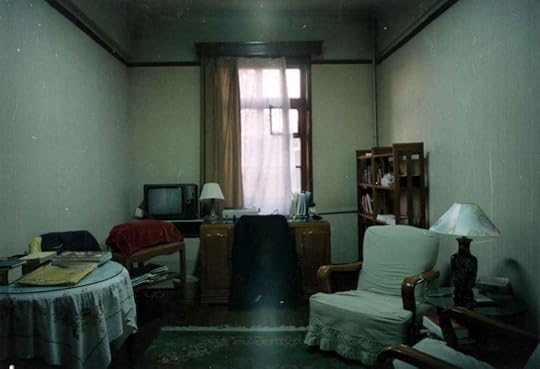
 From top: Friendship Hotel (front building), 1994; the author’s wing, living room, and bedroom (twin beds instead of a queen-size bed were provided seemingly to prevent any improper behavior)
From top: Friendship Hotel (front building), 1994; the author’s wing, living room, and bedroom (twin beds instead of a queen-size bed were provided seemingly to prevent any improper behavior)The Friendship Hotel
Foreigners working in Beijing had long lived in the Friendship Hotel, where the authorities could keep a friendly eye on them. The huge hotel complex, co-built with Soviet help in the 1950s, was featured in the memorable film M. Butterfly (dir. Cronenberg, 1993), based on the true story of a foolish French diplomat (played by Jeremy Irons) who falls in love with what he believes to be a female Chinese opera singer but who is actually a male Dan (female) role performer, as well as a Chinese spy who betrays him. The story is set at the outset of the Cultural Revolution (1966-76) when most of the remaining foreigners living in China were declared personae non gratae and deported; the handful allowed to stay were a select group of regime-friendly writers and media personalities. Foreigners began to trickle back into China in the 1980s. The Friendship Hotel is where my university put me up in the mid-1990s. It’s an instructive case of what a longer residence in the country was like during those years. It was in the early ’90s in fact that visiting rules slowly began to ease. Prior to my arrival, I was told, visitors to the hotel had to register twice, first in a guard post at the outer gate where they were queried on the purpose of their visit and again at our building’s entrance.
By the time I arrived, the rules involving visitors were in flux and involved perpetual guesswork. Visitors were no longer stopped at the guard post but could proceed directly to our section of the hotel. In the foyer just inside our building was a desk where one of the maids was usually on duty to monitor guests and duly recorded their ID number and contact information in a register. But they often weren’t there and guests breezed right in. There were times when the staff knew I had a female over in the evening and times when they didn’t know. I didn’t push things. As they gave me some slack by looking the other way, I observed a certain etiquette in getting any women out in the morning before the maids arrived to clean my room. One day I met a Chinese woman named Shasha who lived on the floor above mine with an American editor at an English-language Chinese press. They were not married. Only the year before my arrival, she had brazenly decided to move in with him. Cohabitating outside of wedlock was still more or less illegal, but the Chinese are wary of scandals involving foreigners and the hotel put up with Shasha for a week or so before summoning the police. It turned out she was something of a virago, already well known to the authorities for her pro-democracy activities, which included operating a democracy-literature bookstore cafe in the ’80s; she had been arrested during the Tiananmen Square crackdown and spent several months in jail. Her notoriety worked in her favor. Regarding this new business as petty, the police ordered the hotel to let her stay put. In other words, the era of relative freedom I encountered at the Friendship Hotel was largely due to the precedent set by Shasha.
Foreign guests, however, were a distinct species, officially on the books and you couldn’t sneak them in. It was illegal, and still is, for a foreigner to reside anywhere in the country without registering either with approved accommodation or the police. What this means is that if you are living in an apartment in China and have someone visiting you from abroad, you are expected to march this person down to the local police station and humbly ask the cops for permission to let them stay with you, even just for a night. Nobody does this of course but it is the law. And it would put you in an awkward position if you were to actually do so, for the police might choose to make things difficult, say by requiring a letter from your workplace vouching for both of you, and until you get that letter your friend stays in a hotel. Or they might refuse outright on the grounds that you aren’t legally qualified to assume responsibility if your friend were to get into trouble. Thus when a Japanese female friend visited me for a week-long stay at the Friendship Hotel, I was in a bind. I wouldn’t have been able to pull off hiding Eri in my apartment, so I duly registered her with her passport at the hotel’s foreign affairs office. They told me she had to book a separate room at regular hotel rates. Moreover, I would not be allowed to stay overnight with her. This was needless to say unacceptable. That evening when we returned to my wing after dinner, several hotel managers were waiting at the building entrance for a showdown. I told them Eri was staying with me. They said she was not allowed. I got my supervisor at the university on the phone and he was able to resolve things (we are still good friends to this day). In fact, the hotel couldn’t have cared less about the morality of cohabiting, it was the breach of protocol that was the problem. When my supervisor agreed to assume responsibility for the arrangement, saving their face, they departed with a sigh of relief.
The next university in Beijing I taught at several years later was less relaxed about protocol. The Foreign Experts Guesthouse was on campus. All visitors had to sign in and out at the entrance and there was a strict 11 pm curfew. If it got close to the hour, they would knock on my door to inform me it was time for my guest to leave. An old male friend from the U.S. once visited me, and even though I had an extra bed they made him put up in a vacant suite and charged him the going rate of USD $30 per day, claiming with the usual refrain it was for my “safety.” Where our safety was not of much concern was the padlocking of the building’s front door every night. Although a guard slept in the office at the entrance, a hasty evacuation might not have been possible in the event of a fire or earthquake.
 Flip sides of a prostitute service card. Left to right: “Holiday Leisure Club: fashion models / office ladies / hot men / custom recommendations / schoolgirls / 24-hr room service / printed receipts / safe, prompt, convenient. Call this hotline.”
Flip sides of a prostitute service card. Left to right: “Holiday Leisure Club: fashion models / office ladies / hot men / custom recommendations / schoolgirls / 24-hr room service / printed receipts / safe, prompt, convenient. Call this hotline.”

We have several paradoxes here. Foreigners were given star treatment in the best hotels, whereas ordinary Chinese would be stopped merely entering the lobby and questioned as to their business. Yet the strictest curfews applied to foreigners. Mostly these curfews were intended to shore up sexual morality — ostensibly anyway; a deeper, age-old fear was spying — yet most hotels had in-house prostitutes. The madam would receive word from reception of the latest male guests and call their room as soon as they checked in; others would go through a routine of calling every room one after the other (you could hear the phone ring in the room adjacent, followed by your room and the room on your other side). If a woman answered the phone, they hung up. Otherwise, it was, “How about a massage?” or “Are you lonely?” In other hotels, a prostitute followed you into your elevator and struck up a conversation. Or they simply knocked on your door out of the blue, sometimes a pair of them. Once in a Holiday Inn in Wuhan in 2004, I was having a drink in the hotel lounge and five women appeared out of a side room, surrounded my table and asked me choose one of them. When budget hotel chains such as Hanting, Jinjiang Inn, Home Inn, and 7-Day Inn popped up around the country later that decade, there was a crackdown on the more blatant practices and sex workers began to work more discreetly, though they were easily reached by their ubiquitous service cards slipped under guests’ doors.
The bathhouse revolution
Meanwhile, the bathhouse revolution had been gathering steam. This astonishing industry bore little relation to the benign camaraderie sentimentalized in the film Shower (dir. Zhang, 1999), which had a moderately successful international run. In the 1980s and earlier in the communist era, bathhouses served strictly as public showers when apartments lacked hot running water. In his City of Lingering Splendour: A Frank Account of Old Peking’s Exotic Pleasures (1961), John Blofeld depicted the more lavish trappings of bathhouses in the 1930s. In the 1990s, this tradition was revived. At first, they were two-story structures, with separate male and female bath areas on the first floor, the male section typically including a hot water pool, and a coed “public hall” (da ting) on the second floor where both sexes dressed in pajamas could mingle freely and sleep overnight on lazy-boy recliners while watching kungfu flicks on the hall’s movie screen. Waiters served tea, beer and snacks, and massage girls were on hand to do foot massage. There were also private rooms with varying numbers of beds, where individuals or groups could sleep in greater privacy, get a full-body massage with a handjob, and in some establishments, paid intercourse. The key thing was that there was never any registration process and anyone could occupy the private rooms (though the doors were not always lockable). They were thus the only place unmarried lovers could shack up; they also served as transient hotels for those who for whatever reason did not want their whereabouts to be known (see The old Chinese bathhouse, circa 2000).


 From top: bathhouse in Harbin, 2000s; relief statue from the bathhouse’s facade at lower left (the uncharacteristically drab exterior of this bathhouse belies the luxuriousness inside); multi-story massage venue in Beijing catering to straight men, circa 2020.
From top: bathhouse in Harbin, 2000s; relief statue from the bathhouse’s facade at lower left (the uncharacteristically drab exterior of this bathhouse belies the luxuriousness inside); multi-story massage venue in Beijing catering to straight men, circa 2020.Around the turn of the century, bathhouses grew in size and luxuriousness, elaborately decored with Greco-Roman themes and other iconography suggestive of Western decadence. One bathhouse I visited in Harbin in the 2000s (pictured) boasted, in the men’s bath section, a large hot pool lined with gold plating and several smaller pools of differing temperatures and colors steeped in a variety of medicinal herbs. In addition to the usual public hall, there was an auditorium with live northeastern-style vaudeville known as errenzhuan; one performance I saw hired skimpily dressed Russian dancers. Buffets grew more sumptuous and compared favorably with those of five-star hotels. Some bathhouses were able to tap into underground hot springs. The Chinese are often stereotyped as lacking in creative imagination; not so the bathhouse industry. There is quite simply nothing of the like in the West, except perhaps the great European spas, but the latter are only preserving a long tradition rather than inventing themselves out of whole cloth as in China. In the 2010s, bathhouses kept evolving into such rarefied exclusiveness that I found myself priced out of them. If you have extra cash to throw around, they would make a good research project to investigate now.
Around 2003, the government suddenly allowed unmarried couples to room together in hotels across the country, no questions asked, provided both registered at reception with valid IDs. This applied to foreigners as well. And then around the time of the Beijing Olympics in 2008, they clamped down on the freewheeling bathhouses and required all those staying overnight to register with their ID, just as in hotels. For a time, receptionists were lax about tracking visitors who snuck in later to stay with you so that they wouldn’t have to register, while daytime visitors were trusted to vacate your room before bedtime. Then in the 2010s, hotels began providing electronic card keys, and you couldn’t go up to your floor in the elevator without swiping your card. At the start of the present decade, hotel registration tightened up considerably, sparked by Covid-19 epidemic measures. No guests or visitors could get past reception without a health code reading on their cellphone indicating they had tested virus-free within the past 48 or 72 hours (or had not traveled from a Covid hot zone). In post-Covid 2023, QR codes are dispensed with, but the registration process remains strict and uncompromising. All hotels now have a national ID scanner for domestic guests, who are also photographed with a webcam at the reception desk. Foreigners all have their passports carefully checked (visa as well as latest entry stamp), scanned and photocopied and their faces recorded by webcam as well. This applies to every person rooming together. As I discuss in Sexual surveillance in the Covid-19 era, though couples who are not married to each other are free to room together, the government now knows exactly who is committing adultery, information which may be of potential interest to certain parties. Also, since the “group licentiousness” law was revamped in 2012, hotels may inform the police if three or more people not of the same sex occupy a room together (families excepted of course), if that is, the hotel allows them to room together.
A very special excursion
In November of 2022, while living and working in the southern Chinese city of Ningbo and travel-starved, the university where I was teaching hastily arranged a group excursion for us to the mountainous city of Ninghai fifty miles to the south. Almost the entire university got to go on the trip. Many buses were involved, and those of us assigned to the same bus were informed by a community representative to be packed and ready to leave and wait for a phone call that evening. I didn’t get the call till 2:30 am and was then told to wait for another call to come a few hours later or sometime in the morning. I didn’t get the second call until noon: our bus was waiting at the gate. It soon filled up with colleagues living in my complex. The drive down to Ninghai was quite nice, actually, and what we could see of the city was green and attractive. The hotel was in an old building but the room was sufficient for the purposes of a week-long stay. Our tour of the city was confined to what could be viewed out the window. Except to retrieve our three daily meals and have our temperature checked twice a day at 6 am and again at 6 pm by workers in white hazmat suits, we were not allowed outside the door of our rooms. As I’m used to daily walking, I created an obstacle course around the room of thirty paces; 200 laps twice a day satisfied my exercise addiction. Alas, we were suddenly informed that our trip would be cut short and we were shipped back home after only three nights, though we were again forbidden from leaving our apartments for the next three days, and an electronic sensor was affixed to our doors to ensure this.

 Ninghai hotel room and a boxed meal
Ninghai hotel room and a boxed mealOur bizarre little outing was carried out, as you may have guessed, as part of epidemic prevention measures. What triggered it was two students on campus who tested positive for Covid. The campus was immediately locked down and everyone connected to the university in any capacity, or who had been present on the campus within the previous two weeks — some 10,000 students, faculty and staff — were ordered onto buses and shipped to available hotels in Ningbo and surrounding cities (those living in the same building on campus as the two affected students were locked down in that building for a week). Married couples, inexplicably, were forced into separate rooms (their children were split up between them). Then just as arbitrarily, they decided that this massive relocation was unnecessary and we were allowed to go back home for self-quarantine. I’m glad I went through this historically instructive and enlightening experience, having a taste of what many millions of others around the country had to undergo more protractedly, such as the months-long, city-wide lockdowns in Wuhan, Shanghai, and other cities. This period has now passed, but its effects linger and spark speculation about the future of China’s hospitality industry. As of May 2023, the government has yet to start issuing tourist visas to foreigners. They will come in due time, but I wonder if part of the reason for the delay is deliberation about how exactly to treat the tens of thousands of expected foreign tourists and how the latter will take to being ordered to stare into a webcam lens fixed on the reception counter, children included, and how they will feel being subjected to a greater degree of surveillance than what they are used to back home; how foreign mixed-sex groups of three or more will take to being advised not to room together or by rooming together not to engage in any activities that violate Chinese law, such as occupying the same bed; or what reassurances they can be given that their private information will not be stored by the authorities or shared with third parties.
What does not appear to be showing any signs of change — I will not mince my words — is the repugnant practice of discriminating against foreign travelers by only approving certain hotels for their use. You do not know the degrading feeling until experienced firsthand, being told you can’t reside somewhere because you’re a “foreigner.” I’m sure they have their rationales for this, namely, there are bad elements out there who are eager to take advantage of you and thus “it’s for your safety.” Only designating certain hotels for foreigners also makes it easier for the authorities to track us. Granted, foreign tourists who travel to China generally won’t notice this problem if they book in advance or in a tour group since international travel websites already filter for approved hotels, and it’s not necessarily that great of an inconvenience. It’s the idea of it, an idea with a long pedigree in China’s history and is inherent in the very word for foreigner, waiguoren, literally “outside country person” or “outsider.” Imagine how your notion of this class of people would be shaped if you constantly heard them spoken of as “outsiders.” A commonly used colloquial term is laowai, literally “old outsider,” as in my “old” friend. Most Chinese know they shouldn’t use this term within earshot of internationals in their country since it is also slightly insulting and patronizing, yet the officially employed term waiguoren is no less problematic. Can any language escape this othering effect of whatever term it employs for “foreigner”? In English, we may speak of “foreign tourists” to distinguish them from domestic tourists, but we don’t regularly use the term “foreigner” by itself. The default assumption is that you are not a foreigner. When it’s discovered that you are a foreigner, then you tend to be labeled by your country — a Brazilian, Japanese, Chinese, and the like — instead of the alien category of “foreigner.” This more humanistic conception ought to start being a part of the public discourse in China.
 Lobby of a budget chain hotel in Beijing
Lobby of a budget chain hotel in Beijing
* * *
Other posts of interest by Isham Cook:
Insights into China (Part 1/3): A walk down the street
Insights into China (Part 2/3): A visit to a restaurant
Sexual Surveillance in the Covid-19 era
Chungking: China’s heart of darkness
Why Airbnb ain’t my cup of tea
The old Chinese bathhouse, circa 2000
April 29, 2023
Insights into China (Part 2/3): A visit to a restaurant
 Upscale Hangzhou cuisine in Beijing. The vertical banner reads: “Dragon Well Boat Banquet”
Upscale Hangzhou cuisine in Beijing. The vertical banner reads: “Dragon Well Boat Banquet”I begin with a textbook case of intercultural miscommunication I once witnessed in a university cafeteria in Beijing. Just as I was telling the server which dish I wanted, a female student standing next to me blurted out to him in Mandarin, “I told you I wanted the shredded pork noodles. Didn’t you hear me?”
Another student butted in between us to indicate what he wanted. The server served him first before walking several pans over to get my dish. This was logical enough; his pan was right in front of the server and mine was several paces away. But the female student was not happy about this and said to a friend standing behind her in fluent English, at which point I realized they were ABCs (American-born Chinese), “I can’t believe he’s walking away!”
Now it was clear they had a little war going on, as the server continued to ignore her. When I finished my meal fifteen minutes later, she was still standing there glaring at him.
You too would be upset if you were ignored by a cafeteria server. But that’s not what initially appears to have set things off. It could have been any number of things. I’d guess she had expected him to acknowledge her request with eye contact and grew peeved when it wasn’t forthcoming, he in turn found her to be rude, and it snowballed from there. I had dealt with this server many times and never had an issue with him. She was likely a new arrival in China, an exchange student a few months fresh off the plane, and her Chinese ethnicity wasn’t of much help as she negotiated her way around the cultural minefield. It was after all not the cook’s responsibility to explain how things worked; he was simply going about his job. She was the annoying anomaly. The moral of the story is that the fault for the communication breakdown lay squarely with her. The burden is not on the host country to explain it all to you; the burden is on you, the guest, to figure it out.
And then there was the incident back in the early 1990s when I had just arrived in Beijing to start a teaching job. It was actually my first restaurant to step into outside my new residence, the famous Friendship Hotel, when the number of foreigners in Beijing could still pretty much fit into a single hotel. The menu consisted of Chinese characters on typed white A4 sheets of paper stuck in grimy plastic sleeves (menus with photographs came later). I had studied some Chinese and could recognize 宫保鸡丁 and a couple vegetable dishes, surprisingly inexpensive at only 2-3 yuan a piece. I ordered a serving of potatoes and a serving of turnips, not sure how they would be cooked. The Kung Pao Chicken came first, filled to the brim with excess oil. Then the potatoes and turnips arrived — in raw slices. It took a moment to register why the vegetables were served raw. Oh, of course. They were meant to go with hotpot. But that’s not what blew my mind. The cooks, waitresses, and manager — the manager! — were standing by the door to the kitchen giggling at me. They had a good laugh at my expense, until I overturned the Kung Pao Chicken onto the tablecloth and walked out without paying. I heard shouting in my direction but they didn’t pursue me out on the street.

 Noodle shop in Chengdu, 1990 (top); restaurant in Harbin, 1994: a ticket purchased at the booth is handed to the kitchen window for service (bottom)
Noodle shop in Chengdu, 1990 (top); restaurant in Harbin, 1994: a ticket purchased at the booth is handed to the kitchen window for service (bottom)They were not very nice. Other restaurants would have handled it better, patiently trying to explain to the clueless foreigner why I couldn’t order those vegetable plates alone. The verdict again, however, is that the fault lay with me. How were they supposed to know my motive in ordering the vegetables? Customers may order whatever dishes they wish for whatever reason, as long as they pay for them, and the restaurant is under no obligation to object.
Let’s turn things around and imagine you’re a Chinese customer in an American restaurant yelling “Waitress!” This is exactly how it’s done in China. You shout “Fuwuyuar!” at the top of your lungs so that your voice can be heard across the restaurant, ensuring that a waitress, any waitress, will promptly appear. It’s not considered rude at all. In the US, it would be so outrageous the restaurant might ask you to leave. And you would be wholly at fault for your ignorance of the country’s culture and etiquette.
(Not that, on the other hand, restaurants in our so-called civilized world are immune from bad management or worse. Don’t ever underestimate the depths to which the staff will stoop if they are not happy with you. In my teens, I once worked as a dishwasher in a steakhouse in Canada. When a customer sent back a steak for being too tough, the cook tenderized it by throwing it on the greasy floor and stomping on it before putting it back on the grill. We were all of us, including the cook, young and immature and thought it hilarious. But I knew it was wrong and hence it has stuck in my memory.)
Chinese restaurant culture today has massively evolved and is scarcely recognizable next to the functional proletarian interiors of three decades ago and their grinding and scraping metal chairs and fluorescent lighting and no decor but for a hastily tacked-on photomural of a tropical landscape, and the raucous patrons who tossed their chewed bones and cigarette butts on the concrete floor.
Nowadays, the more downhome restaurants, called jiachangcai (homestyle cooking) or nongjiacai (farmhouse cooking), are clean and comfortable in a homey way, reminiscent of the reassuringly ordinary American diner. Behind the cashier you can still find a generous selection of strong spirits (baijiu) for customers who want to party a bit since traditionally, though there are bars, there is no bar culture in China; restaurants are where people feel at liberty to get drunk. I usually just grab a beer by opening the glass-paned refrigerator that stands near the cashier and pulling out my brew of choice (the waitstaff duly note this and add it to the tab), as if popping open a beer out of mom’s fridge back home — and refreshingly doing away with our stilted “Would you care for something to drink?” ritual. The Chinese though seldom start off with a beer before eating. They sensibly order their drinks to arrive along with the food so that they’re not imbibing on an empty stomach.
 Homestyle restaurant in Ningbo, 2023. I’ve removed the cellophane from the sterilized saucer, bowl and spoon set.
Homestyle restaurant in Ningbo, 2023. I’ve removed the cellophane from the sterilized saucer, bowl and spoon set. Ordering in Chinese restaurants is disarmingly straightforward. As you sit down at your table, the waitress (they are almost always female) is already standing there awaiting your order. One person typically orders for everyone and selects a variety of dishes. But as almost all restaurants have gone digital, printed menus are rapidly on the way out. You now scan the QR code on your table and the menu pops up on your cellphone. Each dish can be enlarged for a clearer image. I personally dislike e-menus because the photos still remain uncomfortably small when confined to a cellphone screen. Not to mention the loss of more personalized service. In fact, since you pay for the meal at the same time you order it — China has been cashless for many years now — the only physical encounter you may have with the staff is when they bring the dishes. More gimmicky restaurants eliminate human contact altogether and send you your dishes on a wheeled robot.
 Robot server in upscale Chinese restaurant
Robot server in upscale Chinese restaurantChina has also perfected fast food, as in fast, and without unnecessary gimmickry. The cafeteria-style restaurants known as shitang, particularly popular in southern China, have tapas-sized dishes laid out for the taking; some soups and stewed dishes are ladled out from big pots. The food is varied, cheap and delicious. Walk in, grab what you want and sit down; there is no cashier. While you’re attending to your food a server — if the term still applies — comes up, counts the dishes, scans your WeChat or Alipay QR code, and that’s it. The eating experience is seamless, with no extraneous movements expended or delays encountered other than the two seconds it takes to open your payment code.


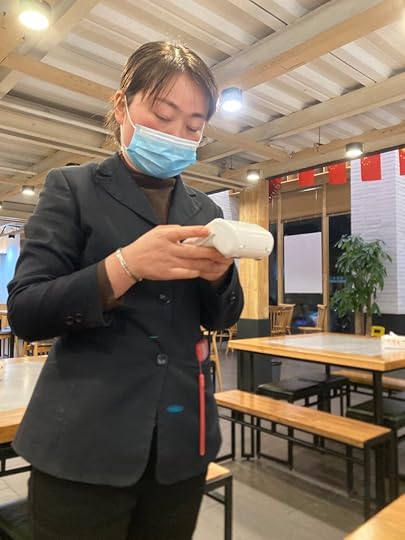
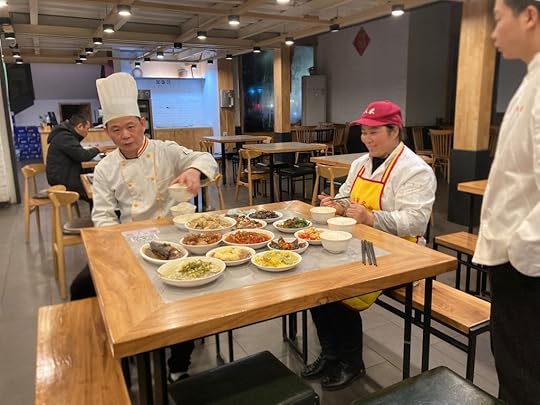 From top: neighborhood shitang (cafeteria) in Ningbo; their local braised “rice fish” (红烧米鱼), greens and rice for about USD $5; waitress scans payment code on my cellphone; the cooks at their own table after the dinner rush hour
From top: neighborhood shitang (cafeteria) in Ningbo; their local braised “rice fish” (红烧米鱼), greens and rice for about USD $5; waitress scans payment code on my cellphone; the cooks at their own table after the dinner rush hourInternational fast-food chains operating in China have rushed to keep up with these digital developments as purchasing patterns shift to pre-ordering food for takeout or at digital kiosks in the store. Most of the country seems to have taken the art of laziness to an extreme and are avoiding the hassle of going out at all. Probably the majority of restaurant food, or close to it, is now delivered. I have seen people ordering a single bubble tea or Starbucks coffee for home delivery. This mass extravagance does have the advantage of providing employment for the legions of food delivery boys. It helps that you don’t have to tip them.
This brings us to our next observation, something North Americans will appreciate about dining in China (and not a few other countries): the absence of tipping and sales tax. The obverse of this is that you don’t have a dedicated server to ensure an optimal customer experience. China has come a long way in this regard as well. Around the turn of the century service began to emerge out of its era of awfulness (satirized in my short story Restaurant Time Warp) as the restaurant business, along with the very notion of customer service, boomed. I mean those days when waitresses would routinely deny any problems and argue with you. The dish is too salty or oily? “That’s how our customers like it.” The serving is too small? “No one else has ever complained about it.” The dish is 45 minutes late? (because they forgot to cook it). “They’re cooking it right now” (it never arrives). There’s a hair in the soup? The waitress picks out the hair and flicks it away. “No, there isn’t.” I saw female customers reduced to tears by tough waitresses who did not back down or admit fault.
The dish that never arrives remains one of the last vestiges of the bad old days and continues to plague even top-end restaurants. While service is now cheery (when you’re not dealing with bots) and waitresses will earnestly try to hunt down your dish if it’s unreasonably late, the problem is endemic to the way Chinese kitchens work. The order in which your dishes are served is essentially random and you have no control over it. If you’re in a group it doesn’t matter since dishes are all shared. The anticipatory surprise greeting each new steaming dish is even enjoyable. This frees up the kitchen to sequence by dish type rather than by table. They prefer to batch-cook popular dishes — killing many birds with one wok. You’ll likely receive one of these dishes soon. The less popular dishes may have to wait until there are several orders which can be then fired up in a batch. Regardless of how organized a kitchen is, someone’s dish inevitably gets lost in the shuffle and left behind. Restaurants today still are reluctant to admit they’ve forgotten your dish and will insist it’s coming right up, so that you won’t cancel it if you’re already full. The best tactic for speeding up a lost dish after you’ve finished everything else used to be to threaten to leave in five minutes if it hasn’t arrived. It would promptly arrive as soon as you got up to leave. But today, as you typically have to pay for your order at the outset, you’re stuck waiting and only in exceptional cases will they agree to refund your money.

 The 2010s: state-operated restaurant in Beijing West Train Station (top), restaurant in Beijing’s 798 Art District (bottom)
The 2010s: state-operated restaurant in Beijing West Train Station (top), restaurant in Beijing’s 798 Art District (bottom)Compounding the kitchen problem is the waitstaff service problem, who are not assigned to different tables but share all tables. The situation has improved in recent years as restaurants find it harder to hire waitstaff at the slave-labor wages of yore and the ratio of waitresses to customers has dropped. Fewer waitresses per restaurant paradoxically results in improved service since responsibility is less dispersed: when there are too many waitresses, they tend to stand around listlessly, assuming all tables are being attended to when they’re not. Diffused responsibility also dovetailed with the gruff, often outright hostile attitude toward service cultivated by communism, when everyone hated their job and just went through the motions. The Big Disconnect between one’s solipsistic universe and other human beings still infuses life in China in many ways. Customers have the bewildering habit of leaving the restaurant or cafe door wide open in wintertime upon entering and leaving, and neither they nor the waitstaff make any effort to close it. Inexplicably, no one seems to notice the blast of cold air rushing in. Then again, no one notices the foreigner who gets up to close the door. Well, I guess if it’s only a problem for us, it’s not really a problem.
Another example of the timeworn apathy that permeates the culture is the sudden, mysterious shuttering of restaurants. It’s somewhat understandable when a restaurant is forcibly closed and given twenty-four hours to vacate because a powerful or well-connected landlord has better ideas for using the space (an enormous share of urban real estate is owned and occupied by the army). More typically, if it’s a popular establishment, the rent skyrocketed when the lease was up. If the restaurant valued their customers, you’d think they would at least post a notice with an explanation or apology, along with contact info if reopening in a new location, but expressions of friendship toward a valued customer base are the exception. The general tenor is that all businesses are fly-by-night operations and it’s only by sheer fluke if your latest gig manages to survive past your next trip back home for Chinese New Year. Restaurants will close with no prior notice if they perceive a drop-off in patronage. They then reopen somewhere else in a new guise and menu for a fresh start. High staff turnover or walkouts due to bad management and low pay also churn this cycle. Customers in turn don’t feel much loyalty toward their favorite establishments. This gives Chinese restaurants a generic, interchangeable quality that represents the practical response to these complications. If one favorite place disappears, many others happily fill the void.
 The Sichuan dish “Husband and Wife Lung Slices” (Kung Pao Chicken on the right)
The Sichuan dish “Husband and Wife Lung Slices” (Kung Pao Chicken on the right)But this is not to say that Chinese restaurants are all the same. On the contrary, there is no more colorful window into Chinese culture than its culinary industry. More interesting than the myriad existing books on Chinese cuisine and cooking would be a history, which remains to be written, of Chinese restaurants. They are in a constant state of flux and change and mind-boggling variation in the mad race to keep up with the latest food fads. Dishes that were standards in the ’90s — Boiled Pork in Spicy Soup (水煮肉), Shredded Pork and Garlic Sprouts (蒜苗肉丝), Husband and Wife Lung Slices (夫妻肺片) — are now hard to find, while Kung Pao Chicken (宫保鸡丁), Fish-Flavored Shredded Pork (鱼香肉丝), or Duck’s Blood and Beef Tripe in Spicy Soup (毛血旺) appear to be inviolable. Explanatory note: “Boiled Pork in Spicy Soup” was supplanted in popularity by “Boiled Fish in Spicy Soup” in the early 2000s. Though delicious, the garlic sprouts of “Shredded Pork and Garlic Sprouts” came to be regarded as too rustic. The bizarre-sounding “Husband and Wife Lung Slices” consists not of human lung but beef tongue, tripe, heart and head flesh steeped in chili pepper oil. “Fish-Flavored Shredded Pork” is not fish-flavored but cooked in the style of fish. “Duck’s Blood and Beef Tripe in Spicy Soup” is a challenging (for Western stomachs) stew of solidified duck blood, various parts of cow stomach (tripe, rumen, omasum), spam, squid (or eel) and soybean sprouts. Meanwhile, some dishes seem to have sprung up out of nowhere, such as Wanzhou-style broiled fish (万州烤鱼) traditionally from Chongqing, a whole fish broiled in a pan steeped in layers of vegetables and spices, which took the country by storm in the early 2000s. It is now a staple of most home-style restaurants and every city has restaurants devoted exclusively to its infinite permutations.
 Wanzhou-style broiled fish with compartments for two fish seasoned in different styles
Wanzhou-style broiled fish with compartments for two fish seasoned in different stylesThe restaurant revolution that erupted around the turn of the century involved much more than the proliferation of new dishes. Branding was discovered and everything was scaled up; chains multiplied and the size of restaurants ballooned. Whole buildings were not merely taken over; they were purpose-built by venture capitalists. Five, six, seven-story restaurants with each story more exclusive than the one below; restaurants with luxury spas occupying the upper floors; bathhouses with five-star buffets and star chefs and in-house prostitutes in private rooms; garishly lit seafood restaurants as big as American supermarkets; waitstaff on rollerblades and walkie-talkie headsets for instant relaying of orders. In the anti-corruption drives under Xi Jinping, we’ve seen a scaling back of these excesses. What continues into the 2020s are more incremental yet steady refinements of aesthetics and taste in both interior design and the culinary arts.

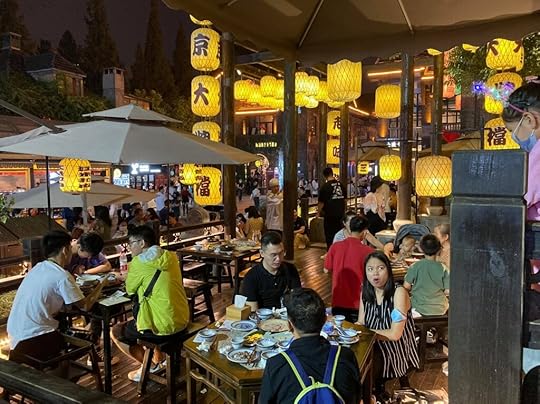
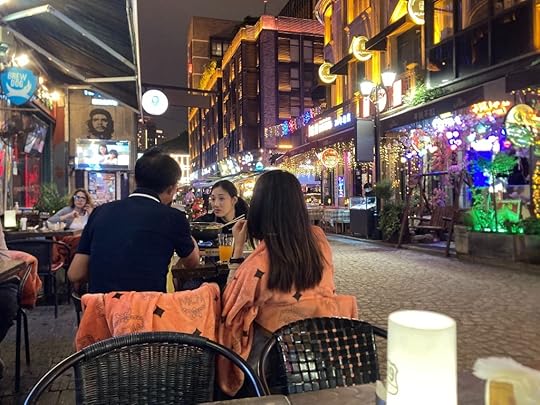 From top: outdoor dining in Shanghai, Nanjing, and Ningbo
From top: outdoor dining in Shanghai, Nanjing, and NingboAt the lower end of the pecking order, small eateries, noodle shops, and portable vendors still crowd the streets, with the difference that sanitary regulations have imposed higher standards on the entire restaurant industry after years of scandals over the use of recycled “gutter” oil and other toxic or poisonous adulterants. In 2016 alone, 500,000 violations were reported by China’s Food and Drug Administration — they were the ones that were caught. The most shocking cases involved restaurants secretly poisoning the food of a rival restaurant to drive their customers away. You can’t entirely protect yourself when eating out except by not eating out. Recycled oil looks and tastes exactly like fresh oil; the carcinogenic toxins are invisible. From a business perspective, however, restaurants would be foolish not to use the cheaper recycled product. But in all fairness, unless your constitution is hyperallergic, and you stay away from the shabbier sort of food outlets, I don’t think your restaurant risks in China are greater than in any other country. The US is not exactly pristine when it comes to the multitude of toxins we consume in food products throughout our lives. Chinese food has one advantage in that dishes tend to be cooked by scalding, which succeeds in killing most bad bacteria and is why they traditionally avoid eating raw vegetables. I’m still alive anyway. I regularly eat out in China and have never experienced anything serious enough to send me to the hospital, though I came close once after a serving of Bacteria Fried Rice in Guangzhou back in 1990 that sent me to my hotel bathroom for the rest of the day.
Restaurant culture dominates life in China, and the Far East generally, to a greater extent than it does in the West. This is because people’s homes tend to be small and cluttered and not set up for entertaining guests. It’s rare for the Chinese to invite friends over for dinner and more logical to invite them out to restaurants. Accordingly, restaurants are outfitted with private rooms with large round tables and Lazy Susans for a more intimate setting. On more formal occasions, it would be unthinkable not to book a private room. Long dinners are often combined with singing in restaurants that have karaoke equipment, and it’s party time. Chinese restaurants don’t really have closing hours; they stay open until the last guests leave, and they may continue accepting new guests until very late. There is no clear demarcation between food-and-beverage and other entertainment establishments in China, leaving a fluid conceptual space that has spawned countless fascinating variations. I’ve mentioned luxury restaurants being combined with bathhouses and spas. In the early 2000s, I recall a nice cafe in a Beijing shopping mall next to a high-end massage venue, with a separate entrance in the cafe that opened directly into the massage shop’s lobby. I then found out that the cafe was owned by the massage shop. Also around that time in Beijing, there was a fad for 24-hour teahouses with tatami-lined private rooms ostensibly for the purpose of protracted business negotiations and yes, sexual negotiations too. North American restaurant culture is much more rigid and the only combining of different functions and spaces we have is the separate bar or lounge area for those who only want to drink or have a drink while waiting for a table.
 Shaanxi Biangbiang noodles
Shaanxi Biangbiang noodlesAmong the Puritans in Colonial America, talking was forbidden during the family dinner out of respect for the gift of food. Silent eating is still practiced by many in northern Europe. The Chinese believe that talking while eating is bad for digestion, not to mention the increased real risk of choking on food. But when it comes to socializing over dinner, these niceties are dispensed with among the Chinese. It’s a loud, intense affair, making repasts almost everywhere else in the world staid by comparison. The Chinese find both the cuisine and the dining experience in the West intolerably dull. This can partly be blamed on food nationalism and ignorance. Food nationalism, or food ethnocentrism, is the belief held as commonsense that the cuisine of your own country is — surprise! — the best in the world. Indeed, next to the vast panoply of Chinese gastronomy, our meager culinary ambassadors in China — McDonald’s, KFC, Pizza Hut — must seem pathetic, though there is a patronizing kind of soft spot for this peculiar snack food, as these chains have successfully been in operation in China since the ’90s. Many Chinese assume that American cuisine must be more varied and sophisticated than that. Yet when they travel to the US they usually turn out to be disappointed. This might have to do with the fact that restaurant choices in hotels and on the road tend not to go beyond so many variations on the sandwich.



 From top: Muslim restaurant in Beijing just before lunch rush hour; their Lanzhou-style beef noodle soup and mutton skewers; Xinjiang-style mutton fried noodles in a Urumqi restaurant; Xinjiang nang flat bread (cognate with Indian naan bread)
From top: Muslim restaurant in Beijing just before lunch rush hour; their Lanzhou-style beef noodle soup and mutton skewers; Xinjiang-style mutton fried noodles in a Urumqi restaurant; Xinjiang nang flat bread (cognate with Indian naan bread)Understanding the culinary culture of a new country requires patience, time and effort, and it takes experience to hunt down more distinctive food. The American palate extends far and wide, with regional dishes galore, innumerable variations on traditional European dishes, vegetarian and vegan alternatives, and over the past decades, an explosion of ethnic food brought to the country by immigration. To insist on what exactly constitutes “American” cuisine misses the point. It’s about the breadth of cuisines available, the internationalization of food, and the possibilities and opportunities for acquiring a cosmopolitan stomach. China has a comparably extensive culinary landscape of countless regional dishes, along with its many ethnic or “minority nationality” varieties in Yunnan, Tibet, Xinjiang and other provinces with their distinct flavors and spices. Chinese cities have a wide choice of Korean and Japanese, and increasingly, Thai and Vietnamese restaurants as well; Korean food has a long history in the country not as a foreign import but as a significant ethnic minority in China’s northeast. This infinite cornucopia is begging to be explored by foreigners in China with an interest in food, just as the rest of the world’s cuisines are waiting to be explored by Chinese who travel or live abroad. It’s not a contest among the world’s offerings or a question of replacing one cuisine with another. On the contrary, enlarging your palate deepens your appreciation for your own country’s cuisine. However, it takes a rare faculty to propel curiosity out of its comfort zone. A select number of Chinese living in the US manage enthusiastically to expand their palate beyond their homeland’s food to no detriment of the latter. For the rest, they wouldn’t touch the stuff and home-cook their own food exclusively. And equally sadly, there are all too many Western expats in China who aren’t able to deal with Chinese food for the same reasons; it’s not uncommon for those married to a Chinese spouse to eat separately from each other at home.
This brings us to the realization of how profoundly psychological a grip food has on us. Let’s say I’m a local male in China with good English who has invited you, a Western woman, on a date to a hotpot restaurant. I make small talk by saying, “I’m not like those usual Chinese guys who expects you to conform to traditional notions of feminity, and you don’t really need that bra of yours.” I’d guess you’d find my suggestion offensive, to say the least. If I said instead, “I can see you’re a little befuddled about how to eat hotpot but why don’t you give it a try?” With this suggestion, you surely wouldn’t have a problem. The actual food, however, would confront the same entrenched defiance, if not your outraged sensibility then deep down in your gut, especially if it involves things like pig neck, intestine, kidney and brain in a bubbling cauldron of chili-pepper oil, to mention some of the weirder delicacies hotpot lovers seek out. Strange food and sex are mysteriously conjoined in their implacable resistance to comprehension, and you recoil by plugging the pacifier of your ingrained habits and prejudices back in your mouth. Yes, let’s out with it: the less openminded you are about food, the less openminded you probably are about sex, and vice versa.


 From top: rabbit head for home delivery; a suspicious-looking (to Westerners) Mutton Pot advertised with a brand of strong spirits, but the same image would have a more appealing connotation among locals in this Nanjing restaurant; likewise the snack food at this typical streetside stand (clockwise from upper left): duck heads, necks, wings, clavicles, claws, pig hoofs, chicken claws, duck hearts, gizzards, and thighs.
From top: rabbit head for home delivery; a suspicious-looking (to Westerners) Mutton Pot advertised with a brand of strong spirits, but the same image would have a more appealing connotation among locals in this Nanjing restaurant; likewise the snack food at this typical streetside stand (clockwise from upper left): duck heads, necks, wings, clavicles, claws, pig hoofs, chicken claws, duck hearts, gizzards, and thighs.One thing that distinguishes Chinese cuisine from the rest of the world’s cuisines is the work involved in its consumption, and the most fanatically consumed dishes tend to be those that involve the most work. People’s fingers are very busy around the Chinese restaurant table, and not just with chopsticks. They don’t feel they are really feasting unless they are fiddling with skeletal structures, pulling apart the bones of animals and birds where they give at the joints, peeling away the shells and cartilage of crustaceans and fish, slurping out sheep shank marrow or the brains of a rabbit head, or nibbling away at the skin and tendons of spicy duck neck or chicken claws. This isn’t “work” but more of an almost sexual struggle. We also fiddle with bones — ribs, legs and wings — a vestige of our carnivorous past. But the Chinese go much further than we do in the excitement with which they dismember their food. Theirs is a more intense, tactile, primeval eating experience, further enhanced by the communal aspect of it, everyone sitting entranced and rapt around the shooting steam and flames of a hotpot or grill, worshipping and diving into the same food together.
My theory is that it’s the closest thing the Chinese have to a recreational drug culture. Nowhere is the use of recreational drugs such as marijuana, Ecstasy and psilocybin tracked down and punished more relentlessly than in East and Southeast Asia (Thailand excepted, with its newly relaxed cannabis laws). In China, all drugs merge into one and are identified in the public mind with a hasty death and hence viewed as terrifying. But without quite realizing it, the Chinese are nonetheless drawn to mind-altering substances, as we all are. They seek out refuge from the harsh monotony of the day and find it in the restaurant and the feast. And I mean “mind-altering” here not in a metaphorical sense but literally so: the fragrant odors, the salivating expectation, the shock to the system of a massive dose of chili peppers, topped off with alcohol to generate a potent euphoric haze. Alcohol is seldom enjoyed for its own sake but is treated as an ingestible social lubricant and a more than adequate mind-altering one; it is the only legal psychoactive drug allowed (nicotine and caffeine don’t quite cut it). Of course, alcohol is a drug even if not identified as such in the Chinese mind, a gendered drug as well; only men are encouraged to drink to the point of inebriation, with their toasting rituals and regimens. Women take a risk in drinking at all, as it signifies to the males present a potential sexual openness. But they do have their mind-numbing Sichuan peppercorn and chili peppers, intoxicants of a worthy sort.
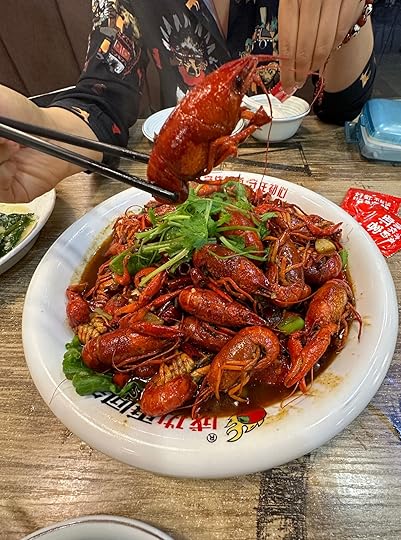 Spicy Crayfish (麻辣小龙虾)
Spicy Crayfish (麻辣小龙虾)A final few words are due on Western cuisine in China today. It has also come a long way. In the top-tier Mainland cities, above all Beijing and Shanghai, followed by Shenzhen, Guangzhou, Hangzhou, Nanjing and other tourist centers, superb international cuisine now abounds. A sea change came in the 2010s when Western entrepreneurs, genuine gastronomes steeped in the restaurant business, pounced on China and launched stylish brewpub chains with shiny ceiling-high fermentation tanks (Great Leap Brewing, Jing-A Brewpub, Slow Boat Brewery, and Arrow Factory Brewing in Beijing; Boxing Cat Brewery and Stone Brewing in Shanghai), and beer varieties expanded well beyond weak Chinese lagers. Superb wine bars could be found within five minutes’ walking distance in almost any direction in the French Concession and Jing’an District in Shanghai. Italian restaurants brought their pizza up to international standards with Neapolitan flour and fresh tomato sauce, and locals learned not to slather pizza in ketchup and Tabasco sauce. Artisanal bakeries discovered whole-grain breads with textured crust and reduced sugar content (bread is regarded as a kind of cake rather than a staple in China). Coffee and coffeehouse culture burgeoned (borrowing heavily from South Korea’s vibrant coffee culture, as I document in The Classic Coffeehouse: Ten Essentials).



 From top: Peiping Machine Taproom, Beijing; women ordering wine at Marina Kitchen, a steak and seafood restaurant in Ningbo; Margherita pizza, Grande Alimentari, Shanghai; pizza with cuttlefish-infused black crust, Cafe Groove, Beijing
From top: Peiping Machine Taproom, Beijing; women ordering wine at Marina Kitchen, a steak and seafood restaurant in Ningbo; Margherita pizza, Grande Alimentari, Shanghai; pizza with cuttlefish-infused black crust, Cafe Groove, BeijingFor all these leaps and bounds, there is one remaining and seemingly insurmountable obstacle. I have yet to find a Western restaurant in China that has learned how to serve a table’s entrees at the same time. Surely they must know, or I imagine they must know, that we do not share our dishes and it is essential we are served together and no one is left waiting so that we can begin to eat. But it seems to be something they just cannot bring themselves to do. I don’t have experience running a Western restaurant in China, so I don’t what goes on behind the scenes (I do have years of working experience in restaurants in the US and Canada). I reckon it comes down to this. For one, it goes against everything Chinese cooks have been trained to do: timing a table’s dishes to be ready at the same time rather than churning them out one after the other results in a train wreck of confusion for them. Western cooks are trained in this at the outset so it comes naturally (though in reality not all of a table’s dishes are finished at exactly the same time; those done early are placed under a heat lamp until the others are ready). For another, Chinese servers likewise are not trained to carry the large food trays, capable of holding four or five entrees, that Western servers deftly balance on their shoulder; they prefer to hand carry just one or two dishes at a time. When trays are in evidence, it is not to bring the entrees to one table but to different tables. Now compound these challenges with “the dish that never arrives” syndrome mentioned above. I cannot enumerate all the occasions when at a Western restaurant in China one of us was served our entree twenty, thirty, or forty minutes after the other, and no amount of protest helped. It puts you in a bind: you can wait patiently for your partner’s dish to arrive while yours gets cold, or you can start eating at their insistence, eating slowly, very slowly, in the hope that their dish arrives before yours is finished.
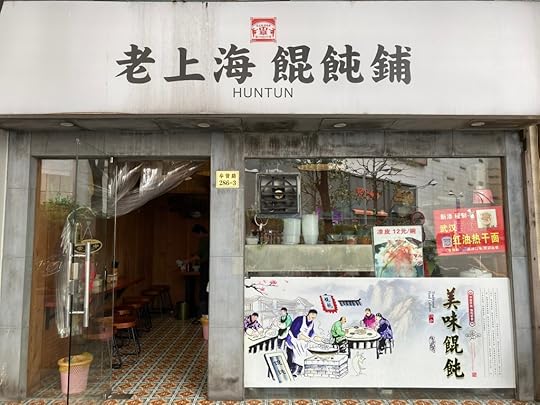 A beloved wonton soup restaurant in Shanghai
A beloved wonton soup restaurant in Shanghai* * *
Other posts of interest by Isham Cook:
Insights into China (Part 1/3): A walk down the street
Insights into China (Part 3/3): A stay in a hotel (forthcoming)
Restaurant time warp. A short story
The classic coffeehouse: Ten essentials
The Chinese-Japanese cultural chasm on display at Starbucks
Black forest cake blues: The customer service problem
April 3, 2023
Insights into China (Part 1/3): A walk down the street
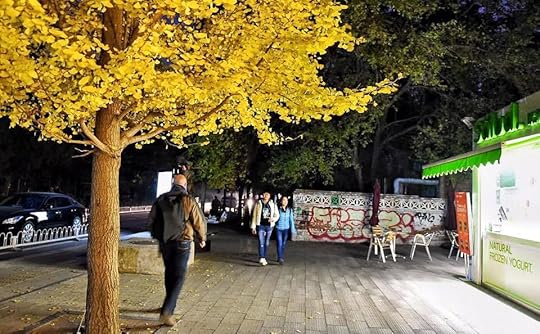
Whoever gets there first
It’s your first day in a Chinese city. After checking into your hotel you decide to scope out the territory on foot. Disoriented from lack of sleep on the long flight, you smack right into a woman walking ahead of you who inexplicably stops in her tracks while looking at her cellphone. You apologize and she ignores you. You proceed but you can’t walk around her because the couple walking toward you don’t give way. You can’t walk around her other side because there’s a slow walker rearing up and not enough space to squeeze around him either. Momentarily trapped, you manage to wiggle your way past these obstacles and are home-free. But only for a moment, as you close in on a solitary pedestrian walking ahead who manages to take up the entire sidewalk — not because he’s large but because he has eyes in the back of his head. He prevents you from overtaking him by veering in front of you as you try to slip by him on the right and then again when you try to slip by him on the left. Now barreling toward both of you is an electric cyclist. You are forced off the pavement. As you jump onto the street, a car pulls up, forcing you back onto the pavement. The driver doesn’t even slow down! Now three people approach who are about to collide with you and the two pedestrians walking next to you. You get out of the way and place yourself flush against the wall along the other side of the pavement. They flow right through each other like ghosts.
How do they do it? And why doesn’t anyone get upset at this brazen buffeting from all sides? Everyone seems to be walking slowly, dreamlike, ambling at a leisurely pace as if not going anywhere in particular. Yet they are all getting on splendidly. The man with the rear-facing antennae, the woman with the cellphone are long gone. If you suspect the Chinese have a different conception of personal space, you are correct.
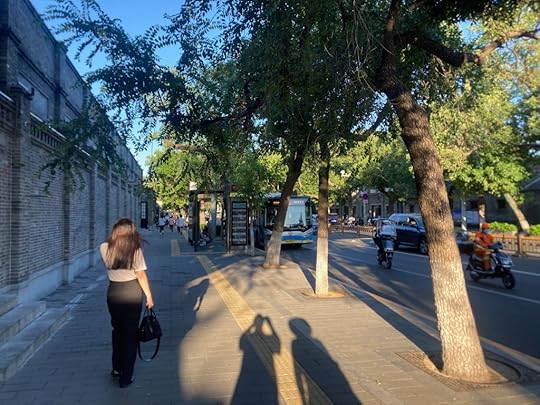 A Beijing street
A Beijing streetYou try to understand it from a North American perspective, where people keep a certain distance from each other in public. It’s as if we are all wearing invisible 19th-century hoop skirts that keep people from trespassing on one another’s personal borders. After years of living in China, I once returned to the US and had forgotten about these niceties. I was standing at a street corner waiting for a right-turning car to pass so I could cross the street. My posture that signaled I was about to cross when the driver stopped and started yelling at me. I wasn’t even close to making physical contact with her vehicle but was leaning forward a bit too much for her liking. Although a mere pedestrian, I had violated her territory.
In China, this would not be a problem. You could lean into a car as it slides past, or better yet weasel your way in front of it and make it yield to you. The driver might be mildly annoyed as he’s forced to wait for you and a whole string of pedestrians — now that you’ve opened up a path — to cross the street. It’s often the only way pedestrians can ever get across the street. But he would hardly be ruffled (accidents are a different matter, as we’ll see below). Similarly, as a pedestrian you could walk down the street more insistently, pushing past and squeezing through people as needed, precisely as they do to you (within limits of course: it’s not football or rugby). And despite all this seeming rudeness, nobody gets angry. It’s just the way it’s done, and they all do it that way.
For the freedom to jostle one another, the Chinese agree not to get upset (though “agree” isn’t the right word; it’s cultural and thus unconscious). This is different from say, Japan, where people also get very close to each other but gracefully manage this without physical contact. The Japanese are acutely aware of each other’s presence, and this extends 360 degrees. They also have antennae in the back of their head, with the difference that they are hyper-considerate and step out of the way to let you overtake them, whereas the Chinese intentionally seem to throw obstacles in your path, as if you are in some kind of a race they can’t afford to lose.
 A Kunming street
A Kunming streetIt took a few years of living in the country to understand that the Chinese are not out to stymie you. They don’t in fact have antennae in the back of their head because the truth is, they aren’t even aware of you. That applies to foreigners as much as to themselves. Now, this was not always the case. Back in the 1980s, so much as step out onto the street and a crowd would immediately form around you like a magnet and follow you everywhere, stunned expressions on their faces. In the ’90s, foreigners were becoming boring; you were still stared at but from a distance. Today, in cities with at least a handful of foreign residents or tourists, you are no longer stared at. It’s a great feeling finally to be able to blend in with the locals. But you are now treated like a local.
To have a conception of personal space, you also need a conception of “public space”: how to defer to others occupying the same space, as is everyone’s right. I may be putting it starkly, but the Chinese have no concept of public space. It’s just space, and it’s automatically one’s personal space. Public space is a vacuum that one occupies until forced off it. It’s why people will step right in front of you, blocking your way even when they can clearly see you coming. And they then have the nerve to avoid eye contact and pretend they didn’t see you! But again, that’s not what’s happening. No thought processes are involved. If they do make eye contact, they’ll be perplexed as to why you’re glaring at them. They are not trying to confound you; your feelings couldn’t be farther from their thoughts. Rather, they got there first. The obverse of this is that people don’t mind terribly being forced off their space; they simply occupy the next available space. No one is laying down boundary markers with chalk to claim their private territory wherever they like. They are just getting on without thinking much about it, like water finding the easiest path. This may involve a certain amount of gentle prodding and pushing. When this happens to you, don’t get upset but just move around them.
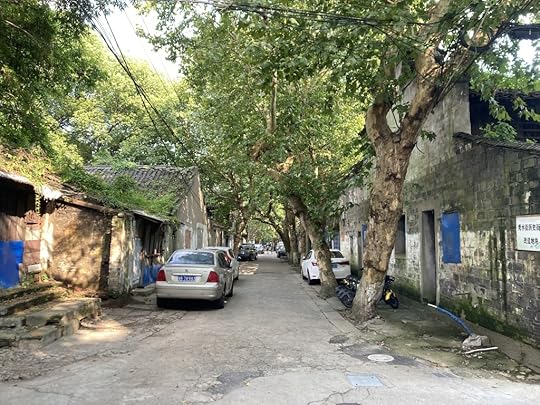 Old neighborhood in Ningbo (soon to be razed)
Old neighborhood in Ningbo (soon to be razed)A very different conception of public space than the rest of us are accustomed to, to be sure, but the system works perfectly well on its own terms. A warning, however. While standing in line somewhere, you may find yourself being jabbed from behind by an old lady’s cane or forearm when failing to keep pace with those in front of you. She may keep nudging you in any case, as if it would get the whole line to move faster. But do not do this with a female if you are a male, especially if her boyfriend or husband is with her. As with anywhere, there are limits it’s good to know about.
Cars on the sidewalk
The Chinese ride bicycles pretty much the same way they walk. Which is to say the only rule of the road is: whoever gets there first. As bicycles can be hazardous to pedestrians and there used to be millions of them, dedicated bike lanes were in general use right up until the turn of the century, when private car ownership took off. As expected, people drove cars the way they rode bicycles. Problems started occurring, compounded by 1) the ease with which one could obtain a driver’s license without having to undergo driver training (you simply paid someone off), and 2) the tendency to ignore traffic lights and the pell-mell that resulted. Regretfully, we didn’t have cellphones back then with cameras, and I lost the opportunity on numerous occasions to document the hilarious spectacle of the Chinese traffic jam of the early 2000s.
 Street in Shanghai’s former walled city
Street in Shanghai’s former walled cityYou might expect that if drivers disobeyed the rules of the road, they would be flying into each other left and right. Accidents in those years were indeed frequent, but people did make efforts not to total several years’ worth of their salary. What actually happened was everything ground to a halt. Never did I feel more empowered as a cyclist, zipping past all those blaring horns unable to extricate themselves from the massive logjam. It took some years for the majority to have their collective eureka moment, namely that obeying traffic signals would enable them to get to their destination faster. Reluctantly, drivers started stopping at red lights. Holdouts who couldn’t bring themselves to cooperate resorted to escape routes, driving into oncoming lanes, driving down bike lanes and even on sidewalks, honking cyclists and pedestrians out of the way when they weren’t running the red, which even today is often treated the way we treat the yellow (look both ways when crossing streets in China!). Businessmen chauffered in their Benzs and Bentleys and government officials in their black Audis were particularly fond of scattering the hoi polloi. These class distinctions were blatant and shameless: the more luxurious your car, the greater your right to occupy asphalt and everyone else be damned.
Up until about a decade ago you could still witness another fascinating phenomenon, a form of street theater known as the traffic altercation. The parties involved could not just accept what happened and work out legal matters. They had to come out on top, with all manner of posturing, pointing, and yelling, and they made damn sure everyone witnessed the performance. Once the police arrived, they would negotiate, bargain, even argue with the cops — all without fear of getting shot. Once I was riding my bike to work when I was halted at a busy Beijing intersection by one such scene. Two waidiren (migrant-laborer) couples on mopeds had collided and were blaming each other. The two men were flailing at each other and the two women were trying to tear each other’s shirts off. The big crowd of onlookers surrounding them occupied the entirety of the street and the traffic was frozen. I noticed that one of the immobilized vehicles was a bus full of dumbfounded elderly Caucasian tourists — probably the most interesting sight on their trip!
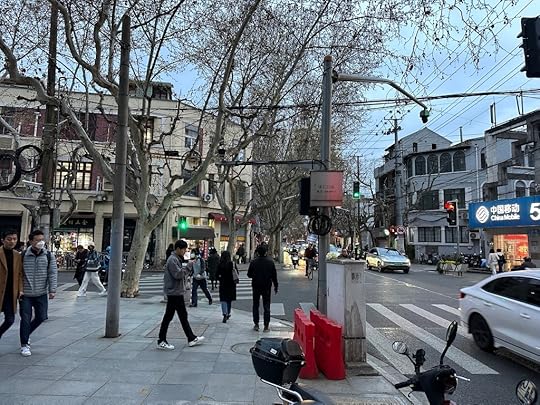 A Shanghai street
A Shanghai streetIn the years since, drivers have become more civilized and cooperative. But we still see class distinctions operating in the way main roads and thoroughfares are built, privileging the tier of the population that can afford a car. To accommodate car owners, streets are growing in width. They are sometimes so wide that not just the elderly but anyone walking at a normal pace can’t get all the way across before the light turns red. Some boulevards accordingly build a pedestrian island with a second light timed to turn green after the first. Other cities outlaw bicycles on many roads, where widening the road is impractical, freeing up lanes for cars (as in Shanghai with its large burden of historic property). Whereas many cities around the world are turning more bike and pedestrian-friendly, the opposite trend holds sway in China.
China also lags behind when it comes to car accidents. I don’t mean the incidence of accidents, which is comparable to the rest of the world, but people’s behavior. As in fleeing the scene of an accident. It used to be quite common — or worse: intentionally killing a pedestrian who’s been struck by a car. Why in the world would anyone do that? Because the punitive legal and financial costs might be greater than if one had simply backed up several times over the injured victim to make sure they’re no longer moving and then reported the homicide as an accident. If they’re dead, they can’t sue you. To be fair, most drivers wouldn’t have had the guts to go that extreme. But it happened enough over the years to generate unwelcome rumors about the practice, only to be confirmed when surveillance camera evidence began appearing on the Internet. Today, unless you’re on some backwater rural road and have a very bad stroke of luck, it’s unlikely to happen.
 Wide boulevard in Ningbo, with two sets of pedestrian lights
Wide boulevard in Ningbo, with two sets of pedestrian lightsWhat might still happen, however, is that no one comes to your rescue if you’re struck. In decades past, you’d be surrounded by gaping onlookers while prone or supine on the street and nobody would call an ambulance or do anything to help, least of all the vehicle that hit you, now long gone. If anyone was stupid enough to take the initiative, they would be the only person you could latch onto and blame for the accident in order to extort thousands of Yuan out of them. After all the fact they’re coming to your aid only implicates them in their guilt, as you explain to the police when they finally arrive. Fortunately, nowadays street cameras are turning this notorious scenario into a thing of the past, and leaving the scene of an accident is less common. China has also amended its Good Samaritan laws to guarantee some degree of legal protection for people who come to the aid of traffic victims.
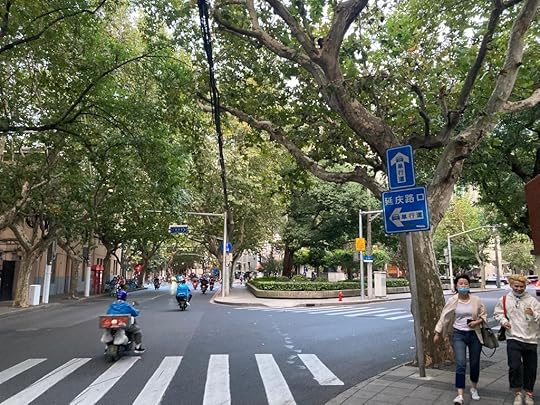 Shanghai deliverymen on e-mopeds
Shanghai deliverymen on e-mopedsVehicular dangers remain, though, in the form of that wild animal known as the electric moped. These beasts fly at you silently from every direction. The frantic deliverymen riding them have a delicate balancing act: getting their goods to you in record time so you won’t complain and cause their commissions to be docked, and not getting in an accident. But accidents do happen, prodding the authorities to bring back bike lines, some with guard rails rather than just a dividing line painted on the street surface. But on really busy thoroughfares like the East 3rd Ring Road in Beijing, bus lanes are prioritized, which e-bikes and regular cyclists must contend with. They are thus drawn to sidewalks and pavements, again because water finds the easiest path, not to mention that a collision with a pedestrian is preferable to that of a car. Still, the last thing deliverymen want is an accident. Their company will take the flak and possibly pay your medical bills, but the poor country boy will likely be out of a job, financially devastated in a lawsuit, or seriously injured. So they navigate among pedestrians very carefully — at speeds that nonetheless match that of traffic on the street.
Don’t make any unpredictable movements and you should be okay. Conscious of their presence especially when out walking at night, when I’m less visible, I frequently look over my shoulder for any e-bikes bearing down upon me, just as I used to look over my shoulder at suspicious footsteps when out walking in my hometown of Chicago. I’d wager your chances of being mauled in an e-bike attack in a Chinese city are statistically greater than being shot in a U.S. city. This brings me to my next series of observations.
Unusual police stations
Walking down the street in China, you may notice how little eye contact there is from passersby. It’s not that they’re afraid of you. Once again, the answer is quite simple. Just as there is no role for public space in China, so there is no role for public eye contact. Yet it’s not entirely a matter of indifference; by tradition, strangers are regarded suspiciously. On the other hand, crime is quite rare, and has gotten rarer over time. Back in the ’80s, it was prevalent enough that females were wary of being alone on certain city streets at night. But even then the incidence of street crime was probably less than it’s ever been in many countries, including the U.S.
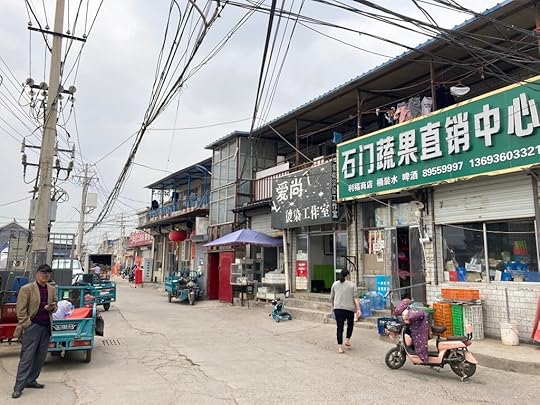 Migrant laborer community on the outskirts of Beijing
Migrant laborer community on the outskirts of BeijingAfter almost three decades of living in China, I have yet to be a crime victim. I think back trying to recall incidents reported to me by others. Around two decades ago a friend’s apartment was broken into at night through their window and a few items stolen while they were sleeping. Also around that time, a construction worker at a university in Beijing where I was teaching raped a female student in a bush. In the ’90s it was not uncommon for women on crowded buses to have their purses sliced open from underneath and their cash plucked out. A few female acquaintances recounted how they had been flashed as children by adult male perverts, often a neighbor. A male coworker of mine around a decade back had a penchant for getting mugged as he staggered piss drunk out of a bar popular with foreigners on Beijing’s Sanlitun bar street. And there were rumors of a rather nasty crime on sleeper trains years ago: thugs going down the aisle knocking people on the head with hammers and robbing them, something that would be more or less impossible today on China’s high-speed trains with their advanced security systems (I have ridden sleeper trains many times and never had a problem).
 Government billboard in a Ningbo park
Government billboard in a Ningbo parkNow that surveillance cameras have proliferated, violent crime is being threatened with extinction. Even before Big Brother’s increasingly voracious facial recognition capabilities, on whatever street at whatever hour of the night in whatever Chinese city, I can’t recall ever being remotely worried about being mugged. Things are becoming boring. There are fewer and fewer reports of crime in the news, only the occasional horrific event, such as the string of deranged men, out to get revenge on society, who went on stabbing sprees in primary schools some years back. Now schools typically have elaborate gates and armed guards. Another reason there’s not much crime in the news anymore is that the media are no longer allowed to report much crime. Cynics and Sinophobes might therefore assume the public is being kept in the dark and schoolchildren are continuing to be slaughtered. I don’t believe this is the case, as rumors would get around if it were. Whatever your position on censorship, one wonders whether the incidence of mass murders in the U.S. might decrease if the American media stopped reporting them.
Safe streets make for relaxed walking, even when the scenery isn’t very exciting. The long-reigning aesthetic was a top-down contempt for aesthetics. Chinese cities looked like industrial wastelands; many still do. You could walk for miles and not encounter a park. It was not until a decade or two ago that the concept of urban beautification took hold. Coastal cities built from scratch, such as Zhuhai and Shenzhen, and coastal cities razed and then rebuilt, such as Ningbo, Dalian, and Tianjin (with a memory of international influences and styles in their DNA) generally did a better job. Urban planning was now evident and generous parks sprung up.
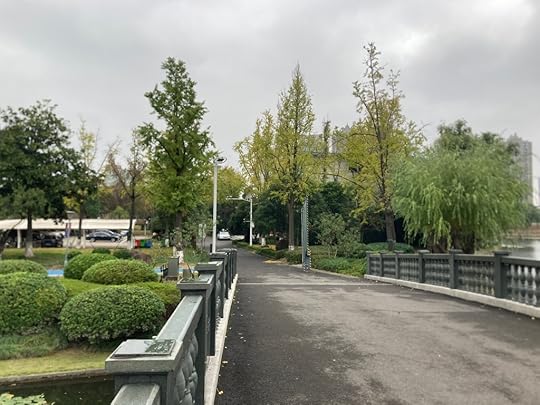
 Police station in Academicians Park, Ningbo
Police station in Academicians Park, NingboI’m walking down one such park today in Ningbo, a large wealthy port city south of Shanghai, with an unfortunate history of being attacked — by the British in the First Opium War in 1841, then by the Taiping rebels in 1861, and again by the Japanese in 1940 (who dropped a bomb containing the bubonic plague on the city). Academicians Park is a bucolic two-kilometer stretch of winding canals, arched stone bridges, and jogging paths. As I cross over a bridge in the middle of the park, I see a tall post with something familiar at the top — a surveillance camera — and on the other side, a cop car. Is that what I think it is? It is indeed a police station. Quite a substantial one in fact. There’s food for thought: a police station in a park. I saunter past and suddenly rather eager to leave cut across to the nearest exit, which faces the main gate of Zhejiang Wanli University. Ah yes, now I understand. The police station is there to protect and reassure the campus’s twenty-thousand students that it has their safety in mind! Curiously, though, I don’t recall seeing any students in the park.

 Library with police station in Ningbo
Library with police station in NingboI continue along Qianhu South Road. Although this section of the city was only recently developed from reclaimed farmland, the landscaping is thoughtful and the street generously lined with trees on both sides. I come upon a library, a mammoth futuristic structure designated (in Chinese and English), “Library and Information Center The University Zone of Ningbo.” Is that again what I think it is, peeking out over the broad steps to the main entrance? I mount the steps and yes, there it is, a police station, our safety once more being considered. Especially in a library. How thoughtful of them. I’m presuming the “library” and the “information center” functions are kept separate so that users don’t have to ask the police how to find a book. Come to think of it, there’s been news of late that this law-enforcement creativity is now a major export as Chinese police stations have been popping up in many countries. Yet before you marvel at this dystopian achievement and congratulate yourself on living in a free society, let’s restore some perspective. Our own police stations may be less conspicuous, but in no country have I seen as many police cars prowling the streets as in the United States.
Nested cities
Before the end of Imperial China in 1911, Beijing was a nested city. A wall surrounded the entire city and access into the “Outer” or “Chinese City” was controlled through a series of gates to keep out the peasants and vagrants. A second wall within the Chinese city surrounded the “Inner” or “Tartar City,” reserved for the Manchus, who ran the capital (funds fell short and the Outer City wall ended up surrounding only the southern half of Beijing). Access to the Inner City was again strictly controlled to keep the Chinese residents out. A third wall within the Inner City enclosed the Imperial City, for the Manchu elite. A fourth wall within the Imperial City enclosed the Forbidden City, which housed the royalty. Beijing’s walls were designed both to keep the different social strata in their proper place and make it difficult for anyone to penetrate or attack the interior.
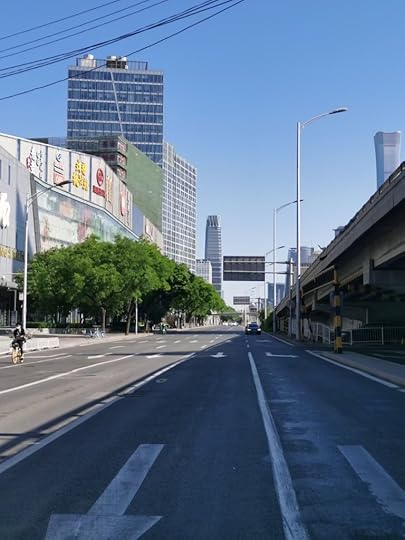 Beijing’s East 3rd Ring Road during a Covid lockdown
Beijing’s East 3rd Ring Road during a Covid lockdownIn the latter half of 2022, those of us living through Covid in China were growing uneasy and alarmed at the country’s epidemic measures. It seemed that the authorities weren’t planning on ending the lockdowns anytime soon but, on the contrary, wanted to bring back the nested-city tradition once and for all. In other words, the pandemic was merely the occasion for an ulterior purpose: to keep the population compartmentalized in their neighborhoods and restrict people’s movements as much as possible. For the first time in history, a powerful means became available for achieving this dour vision: the electronic tracking technology embedded in every citizen’s cellphone.
We could see the technology evolving step-by-step in this direction. In 2020, the first year of the pandemic, the measures were comparatively crude. We were issued passes for coming and going from our residential communities (which in China are usually gated; new gates sprung up where they hadn’t been before). Stores and restaurants required patrons to write down their contact information and have their temperature read with a thermometer gun. By year two, we had installed a government-mandated health app on our cellphones and were scanning the app’s QR code at the entrance to every shopping mall and again at every shop and restaurant within the mall. There was a justifiable rationale for this. The app indicated whether we had traveled to a Covid hotspot within the past two weeks. Were we in fact infected, they’d be able to trace the chain of transmission more precisely. Another measure was to require anyone traveling to another city to get a NAAT test (throat swab) within 48 hours of boarding a flight or train.
In year three, around the time of the Great Shanghai Lockdown (April-May), cities around the country began requiring everyone, not just travelers, to submit to regular throat swabs every 48 or 72 hours (sometimes every 24 hours; it varied from week to week). Fortunately, these mandatory tests were free and often conveniently located in makeshift booths in every neighborhood, but it did create massive inconvenience in terms of planning around them, going out of our way, and standing in line. There were three codes: green, yellow (you were overdue or in a hotspot), and red (you were Covid-positive or a close contact). You wouldn’t be arrested if you were overdue for a test (though some were indeed arrested by police who overstepped their bounds), but if your code was yellow, you were barred from all shopping malls, supermarkets, restaurants, hospitals, schools, buses, taxis, the subway, and even parks. (Some cities had an intermediate gray code, less severe than yellow but barring you from many public spaces and shopping malls.) If your code was red, you were promptly shipped off to a quarantine center or hospital.
 Blockaded Ningbo street during a Covid lockdown
Blockaded Ningbo street during a Covid lockdownIt got worse. If you happened to be in a neighborhood where someone turned up positive for Covid, the affected area, which could involve several square kilometers of adjacent apartment complexes, was immediately locked down without warning. Some people were sent to quarantine centers with only a yellow code; others were reportedly barred from their apartment complexes and thus their own homes. If you managed to make it home but had been physically present in the affected area for up to two weeks prior to the lockdown, you were contacted by officials and forced to quarantine at home for two weeks. Hotels in affected areas were likewise locked down and guests stuck in their rooms for the duration of the quarantine period (and required to pay the daily rate), which could last weeks and occasionally months. Cities forbade entry to visitors; existing visitors not allowed back home were stranded. Airline, train, and bus service was severely cut back or halted altogether in any case. In the chaotic final months of 2022, as the virus broke through and spread uncontrolled throughout China, whole cities underwent rolling lockdowns, with all businesses closing and people confined to their communities or complexes. Barricades started appearing everywhere, blocking streets and corralling people like animals into a dwindling number of narrow corridors.
 Beijing’s East 3rd Ring Road
Beijing’s East 3rd Ring RoadWhile the government was trumpeting its success in keeping the virus out of the country, the depressing realization took hold that the lockdown measures had nothing to do with public health and everything to do with power for its own sake. The authorities had discovered how remarkably easy it was to control the entire population down to every citizen through the electronic leash known as the cellphone, and it was thoroughly intoxicated by this power. How could they ever give up the drunken magic of this newfound omnipotence? They didn’t have to do anything as long as the cellphone was people’s most prized possession. We began to envision a world — some were calling it the “North Koreanization” of China — in which the virus was long gone and the same “health” apps would remain in place to micromanage a population now rendered wholly powerless (allegedly, North Koreans are only permitted freedom of movement between their home and workplace). The Chinese would no longer be allowed out of the country to travel or emigrate, and international tourism to China would be dead in the water, as no foreigners would put up with installing Chinese surveillance apps on their phones. And all the billions lost from the tourism economy? The tradeoff would be well worth it from the government’s perspective, as they would have achieved what no other regime had ever managed: a perfectly stable, obedient, and orderly society, the dovetailing of Orwell’s 1984 with Huxley’s Brave New World.
One became conscious of freedom of movement as a right even more basic and important than freedom of speech. How dare they prevent people from getting on with their essential movements, their multiplicity of activities and places, their jobs, their lives? I think there was a critical mass of revulsion that finally brought the pragmatists in the government to their senses in January 2023 with its sudden about-face. Even they didn’t like what they saw when they looked in the mirror. Of course, they had already lost the battle with the virus, the economy was in freefall, and they really had no choice. The collective relief we all experienced was palpable and orgasmic, so much so that one suspected it was all part of the plan. Hatred had been building — and suddenly, happiness and joy as the government appeared to wash its hands of the whole pandemic nonsense faster than anyone could process.
 A brigade of disinfectant sprayers on a Beijing street during the 2022 pandemic drive
A brigade of disinfectant sprayers on a Beijing street during the 2022 pandemic drive* * *
Forthcoming:
Insights into China (Part 2/3): A visit to a restaurant
Insights into China (Part 3/3): A stay in a hotel
Other posts of interest by Isham Cook:
Sexual Surveillance in the Covid-19 era
How to have fun in China’s disposable cities
The Chinese art of noise
The poverty of the institutional imagination: The case of Beijing’s moats and canals
The ventriloquist’s dilemma: Asexual Anglo travelogues of China
December 30, 2022
“Qiezi.” Fiction

Swinging down her sack, Qiezi dumped out the bloodstained rags and began washing them. She worked with practiced speed, but the current would move many li downstream before all were restored to their pristine gray, rinsed out and stacked on the old slab of rock beside her. Squatting, she then loosened her pants’ cotton sash and pulled them down. Gently, ever so gently in thumb and forefinger she took from between her legs a protruding stem and extracted a sodden tube tied with a string at the end. She opened the tube and pressed out a compacted mass of blood and ash into the stream and watched as the red explosion was washed away, before tossing in the tube’s remaining shell.
Her ear held a flower, long, white and tubular, which she now took in her fingers. Pressing the splayed petals together, she moistened them in her mouth, twisting them into a point so that the flower held firm as she gently, again ever so gently, guided it in all the way up to the stem.
Qiezi gathered up the stack of rags and carried them further along the creek’s edge. She was parting some bushes along the way when she turned and listened: a rustling in the bushes beyond the path, a crunching of the soil beneath departing footsteps. Frowning, she returned to her task and emerged into a sun-filled cavity where more rags hung on a string. She bundled the dried rags into the sack and strung up the wet ones. Returning to the path, she bounded up the bank and headed home to the village.
Back at the house, Li Er slapped the opium bed. “Whaddya think, Yan Xian? This nanmu wood is pretty solid, eh?”
Yan Xian checked the flagon of yellow wine heating on the brazier and poked at the charcoal with the fire tongs before sitting back down at the square table. “Who said it’s nanmu?”
“The dealer did.”
“It has about as much chance of being nanmu as this wine of yours is the elixir of immortality. I hate to disappoint you, but it’s pine.”
“It’s not pine!”
“Li Er, how much do you know about wood? Can you identify nanmu?”
“Can you? Look at the swirls in the grain.”
“That’s what he told you? All wood has wavy patterns like that. You could never afford nanmu. Only rich families can. You were cheated.”
“I told you. It was stolen from an abandoned house that was flooded. That’s why it was so cheap.”
“Why are there no water stains?”
“Of course, they repaired it.”
Yan Xian jabbed his finger at Li Er. “If this were real nanmu and word got out, crooks would rob us in our sleep and steal the bed to sell it. You would get us killed! That’s why it’s not nanmu.”
Li Er stood up red-faced. “I was not cheated!” he yelled.
“All right, all right, calm down you two,” said Lai Xinru. “Sit back down, Li Er.”
“Okay, I will sell it and buy a new house with the money. And I’ll take Li San with me as well.”
Yan Xian laughed off this suggestion. He refilled their wine cups and the four of them toasted. “What do you think of that idea, Li San?”
“He’d come running right back, bed or no. He’s still afraid to admit he wants to fuck me,” said Xinru, holding a bowl of melon seeds. “Now move that kang table out of the way so I can sit there. But where do we put these?”
“Put it on the floor,” said Li Er. “I’ll hold the seeds.”
Xinru slipped in between Li Er and Li San and pulled their arms around her shoulders. “C’mon, Li San, don’t be shy,” she said, pressing his hand down on her chest.
“These beds are designed for two people,” said Yan Xian.
“Two opium smokers,” said Li San. “The kang table is for putting the opium implements on.”
“That’s an idea. Any money left over after buying that jug of Shaoxing wine? How expensive is opium?” asked Yan Xian.
“I don’t know anything about that.”
“Wouldn’t Qiezi know? She’s the expert on drugs,” said Li Er.
“She wouldn’t know anything about opium. She’s never mentioned it,” said Xinru.
“Why does she have such an unusual nickname?” said Li San. “Eggplant.”
“She was always bringing in eggplant flowers as a child, sticking them in her hair. We teased her with the name and it stuck.”
“They were mandala flowers,” said Qiezi, who had just entered with her sack. “I told you that many times.”
“Yes, they look similar. But you brought eggplants home too, dear,” said Xinru.
“How did she learn so much about plants?” said Li San.
“She was very curious as a child. Always hanging out at the apothecary’s shop. He had these big books on plants — what do you call them? Botanicals, herbals, or whatever.”
“He taught her to read and write,” said Yan Xian.
“I taught myself,” said Qiezi, emerging from the bedroom.
“They were asking about opium, Qiezi. Have you ever seen any opium plants?”
“That’s imported.”
“Doesn’t it grow in China?”
“I haven’t seen any around here.”
“Qiezi, can you tell what kind of wood this is?” inquired Li Er. “Your dad thinks it’s only pine. But it’s much better than that. It’s nanmu.”
“I know trees but I don’t know wood. Isn’t nanmu from Zhejiang Province? That’s pretty far away.”
“She can identify any kind of plants?” said Li San.
“Oh, can she ever,” said Xinru. “One time, we were at the Taoist temple. There was a scroll painting on the wall. A landscape painting, with a teahouse scene. She was staring at it and the priest came up and started explaining it to her, all about the figures in the painting, the men drinking tea. And what does she do, she starts explaining it all to him, about the trees and foliage in the painting! They were talking right past each other and it was the funniest thing you ever saw. But her knowledge is very useful. She gathers all the medicinal herbs we need. We don’t need to rely on quacks.”
“How old is she?” asked Li San.
“Seventeen.”
“Why isn’t she married off yet? Is it her unbound feet?”
“We’re from the hills, you know.”
Qiezi was sweeping the floor and bent down with a rag.
“She’s a real beauty, isn’t she, Li San?” said Li Er. “She’s got your full hips.”
“You keep saying that,” said Xinru, sticking her finger in his face. “Don’t start putting ideas into your brother’s head.”
“You know there’s a market for her type. There are actually connoisseurs of unbound feet. She must attract some attention at the town fair.”
“That reminds me, when is the next fair?” said Yan Xian. “The one that all the girls attend — the Seven Sisters Festival. Isn’t that coming up soon? You’ll see more hips there than at any other time of the year.”
“It’s the seventh day of this month, papa.”
“That’s the day after tomorrow. Are you and Xinru going?”
“We can’t,” said Xinru. “It’s the bad time of the month. For both of us.”
“So? What does that have to do with anything?”
“We’re unclean. You know the rules.”
“Bah! Whoever pays attention to that? Anyway, you don’t have to go inside the temple. All the fun is outside.”
“It’s a woman’s festival. It’s important to them,” said Li Er.
“It’s important to the gods,” said Xinru.
“Nobody cares about that anymore,” said Yan Xian. “You think there’s not a single woman at the festival during her unlucky week? They must be slipping on the temple steps from all the blood leaking out of them.”
Li Er’s wine cup smashed against the wall behind Yan Xian. “Don’t insult the women!”
“Oh, you broke one of the wine cups! That’s it, no more wine for you, Li Er,” said Xinru. “Control yourself.”
“Careful with property that’s not yours, Li Er!” said Yan Xian.
“Careful with how you insult your women, Yan Xian!”
The two men were circling each other around the table.
“Cut out the grandstanding, both of you! Li Er, now sit back down here. Yan Xian is just provoking you,” said Xinru.
“He knows that. I can see that grin of yours behind your phony mask of rage, Li Er,” taunted Yan Xian.
“Fuck your mother!”
“Show some respect for the man of the house, elder brother,” said Li San.
“Yep, there it comes, that big smile of yours. No need to get so worked up about this temple business, Li Er. If the women want to go or not, it’s their business. In this house, we talk about things freely. You’d better get used to that.”
“And what do you think the temple priest would say if he heard you talk like that?”
“I wouldn’t be talking to him like that in the first place. What would he say about a grown man hurling his wine cup across the room? C’mon, let’s have another toast.”
“You two have to share Li San’s cup now,” said Xinru.
The brothers resumed their position on the opium bed, Xinru entangled between them. Yan Xian filled their two remaining cups. Qiezi, sitting at the table, covered her mouth and giggled as they tried to work out whose cup was whose.
“I really can’t believe all the women at the temple fairs are not on their unlucky days,” said Yan Xian. “And how would the priests even know? They can’t exactly ask them. But I’m sure they’d love to check!” He burst out laughing at this. “Xinru, are you really sure anyone cares about that anymore? It’s just an old prejudice that died out a long time ago and you women just haven’t realized it yet. Has anyone ever warned you about it?”
“All of us know of it. It’s a tradition.”
“Oh, we could ask Old Zhao,” said Yan Xian. “He would know. He’s a Taoist.”
“And if he says it’s still followed strictly, as I’m sure he will, then that takes care of that. You three can go to the festival regardless.”
“We don’t want to be gawkers, with no women accompanying us. And if he says it’s not, then all of us can go. I’ll go get him now. He’s just a few minutes away.”
“I don’t think that’s a good idea, with Li Er and Li San here,” said Xinru.
“We’ve known him for years. He’ll understand. The two brothers helped set up our new opium bed and we’ll tell him they’re just staying for dinner.”
“And if he asks how we got it?”
“What’s wrong with an opium bed? It’s just a new piece of furniture. It’s for guests. Fix some tea and snacks for him, Xinru.”
“I’m in no shape. I think I’ve had too much to drink,” she said, clasping her cheeks.
“He’ll just be staying for a short time. Put the wine away and get the place straightened up. I’ll be right back.”
“You two sit at the table,” Xinru said to the brothers. “Qiezi, clean up the broken cup. I’ll prepare the snacks. Oh, heavens, I’m so flushed.”
“Mama, your naizi are hanging out. You’d better button up and fix your hair. They’ll be right back.”
“How fresh her language is,” said Li Er. “You’ve been corrupting her.”
“You’re the one who took them out. It’s you who’s corrupting her,” said Xinru. “Qiezi, you don’t have any rags drying outside, do you?”
“You know I take care of that down at the creek now. But Rui Mian was spying on me again today.”
“You saw him?”
“I heard him.”
“How do you know it was him?”
“I know it’s him.”
“Who’s spying on her?” said Li Er.
“The neighbor here, right across from us.”
“With the outhouse facing your door and the bad smell?”
“Yes.”
“Why is he spying on her?”
“He’s a pervert,” said Qiezi. “He hides out hoping I’ll be heading down to bathe, so I stopped bathing there.”
“What gives him the right to put his outhouse there?” said Li Er.
“Tell me about it!” exclaimed Xinru. “It sits right over his latrine pit. Its door used to face inside his house but he recently rebuilt it so it faces outside — directly in front of our entrance! And with such a narrow lane, it really gets in the way.”
“I was going to ask you about that,” said Li San. “The smell is pretty intense.”
“We told him and he ignored us. He claimed it’s his own property and he can do as he pleases.”
“Can’t you bring it to the yamen’s attention?”
“They won’t take any action. They could lash out at us for wasting their time on such petty business. Oh, they’re back.”
“What’s that bad smell outside your door?” Old Zhao asked Yan Xian as they entered.
“Old Zhao, so nice to see you again!” said Xinru, bowing energetically. “Please come in. Come in and sit down.”
“Lai Xinru, how are you? And Yan Zhengzai.”
Qiezi bowed to Old Zhao. “Hello, teacher.”
“We’d be honored if you could sit over here on our new opium bed,” implored Yan Xian.
“Please don’t stand on ceremony with me. I’ll just sit at the table.”
“These stools are too shabby. Please try the opium bed. Here, let me put the kang table back on it. Xinru, bring Old Zhao some tea. And some wheat cakes with onion sauce.”
Old Zhao remained at the table, while the others remained standing. Yan Xian proceeded to introduce Li Er and Li San, hired, he explained, from a distant village to do some carpentry work on the house.
“I see. So you built this opium bed?” Old Zhao asked them.
“They’re expert carpenters. Even if it is only made of pine,” said Yan Xian, sitting down at the table.
“Made of pine?” said Old Zhao. “Who makes heavy furniture with pine? Pine is for tables and cabinets. It looks to me like elmwood.”
“See, Yan Xian, you didn’t believe us.”
“You said it was nanmu.”
“I was only joking! It’s elmwood.”
“And where are you two staying, may I ask? At the inn?” asked Old Zhao.
“We’re putting them up here. The inn is too far away,” said Xinru.
“Now you be careful, Yan Xian. You know it’s illegal for strangers to stay with villagers without registering at the yamen.”
“People do it all the time, Old Zhao. You know that. And it’s just for a few days. This is a guest bed, after all. But we wanted to ask you something, about that old proscription against women visiting the temple during their unlucky days. We all wanted to attend the upcoming Seven Sisters Festival together and show these two handsome chaps around town.”
“It’s their unlucky days? Of course, they shouldn’t go.”
“I see. I just can’t believe that all the women observe it.”
“Yan Xian, we don’t have to go,” said Xinru. “There’s no need to make a fuss about it, now that you have it straight from Old Zhao.”
“The festivities are the same every year,” said Qiezi. “I don’t care if I miss it.”
“Old Zhao, can we ask a favor of you?” said Xinru. “You noticed the bad smell outside our door when you arrived. It’s Rui Mian’s outhouse, which he rebuilt with the door facing outward. It’s a real nuisance. Could you have a word with him about it? He ignores us.”
“He rebuilt it facing the street? What gave him the right to do that! Have you been feuding with him?”
“Not at all. He just did it. Without consulting us.”
“That’s not reasonable. Yan Xian, let’s go have a word with him now.”
Led by Old Zhao the men headed out into the lane, followed by the women. They had to go around the outhouse to reach the entrance to Rui Mian’s house. Rui Mian happened to be in the outhouse and at that very moment, the door swung open right in Old Zhao’s face, knocking him down.
“Watch what you’re doing, Rui Mian!” said Yan Xian. “Look what you’ve done! We were just coming to confront you about this.”
“I didn’t see you coming. I’m sorry but it was an accident.”
Yan Xian helped Old Zhao up. “Are you okay, Old Zhao?”
“This outhouse is a hazard for just this reason. You need to remove it!” said Li Er, kicking the outhouse.
“Rui Mian, you have the right to your outhouse but not when it opens onto the lane, and right in front of your neighbor’s entrance!” said Old Zhao.
“It’s my property. If Yan Xian wants to build his own outhouse here too, he’s welcome to. It is none of my business and mine is none of his business.”
“We’re decent enough to have our outhouse behind the house.”
“Yes, the same place where you dry your women’s polluted rags. Is that decent? Do you know how offensive that is? Aren’t you aware they can only be dried in the women’s chamber?”
“What rags? There are no rags there,” said Xinru.
“That was until your miss started drying them down by the creek.”
“How do you know that? Were you spying on her?”
“Everyone has a right to go to the creek, and I know where she tries to hide your pollution.”
“It’s out of the way and nobody would know about it unless you’re deliberately seeking it out!” said Xinru.
“You’re missing the point,” said Rui Mian. “It doesn’t matter if no one sees it. It’s not just outrageous and disgusting to display women’s pollution in public, it offends the heavens! I’m warning you, Lai Xinru and Yan Zhengzai, you will bring bad luck to us all. And by the way, I know what goes on in your family inside that house of yours. The whole village knows it.”
“This outhouse is far more offensive. It’s a danger to people passing by. Kowtow and apologize to Old Zhao for knocking him down, before we report you to the yamen!” said Li Er.
“Don’t push things, stranger. You wouldn’t dare do that, for you know what the consequences are of unlawful cohabitation and illicit sex on top of it!”
“What evidence do you have for these unfounded allegations?” said Yan Xian.
“How dare you insult Yan Xian’s wife! Let’s just take care of this matter right now.” Li Er threw himself against the outhouse in an attempt to topple it. As Rui Mian pushed Li Er away he was punched in the face.
“Stop fighting!” said Old Zhao.
With gusto and as if for sport, Li San launched a flying kick and dislodged the outhouse, which collapsed in a pile of planks and beams.
“Watch out, Li Er!” shouted Yan Xian as Rui Mian picked up a wooden beam and swung it at him. Li Er caught the beam in his hands and swung it around the other way, hitting Rui Mian in the head. He crumpled to the ground. By this time other neighbors had emerged into the lane.
“Oh, no. It’s come to this!” said Old Zhao, as he bent over Rui Mian. “Are you okay, Rui Mian?”
“You flat knocked him out, Li Er,” said Yan Xian. “Let’s sit him up.”
They slapped Rui Mian on the face to try to rouse him.
“He’s breathing and his pulse is still there,” said Old Zhao.
They carried Rui Mian, who lived alone, into his house and lay him on his bed.
“Qiezi, can you tell if he’s okay?” said Xinru. “Or do we have to go get help?”
“If he doesn’t revive soon we’ll have to get help.”
By the time Old Zhao returned with the doctor and two constables from the walled town ten li away, Rui Mian was dead.
One constable held the Li brothers under guard in Rui Mian’s house. The witnesses including the Yan family were ordered to stay put. The other constable went back to fetch the district magistrate. He had to be called from home to perform the inquest — it was already early evening — and upon arriving at the crime scene on horseback with several yamen runners interviewed the witnesses in turn. The doctor, who also served as the town coroner, confirmed the cause of death to be a blow to the crown and right temporal lobe of the forehead. The two brothers were arrested and escorted to the yamen along with Rui Mian’s corpse.
The next day the witnesses including the Yan family were summoned to the yamen for formal depositions. Li Er was saved for last. Bound by his hands and feet, his face glassy from the sweat pouring off, he was brought into the courtroom and pushed down on his knees before the magistrate, who sat at a high desk, surrounded by a secretary, a court scribe, and wardens. The trial functioned simultaneously as an interrogation. “If you want to avoid the instruments of torture, testify the whole truth!” said the magistrate, pointing to a tray of unfamiliar tools. “Name?”
Li Er identified himself, his home village and occupation, and his purpose in traveling to the present township.
“You have been staying with the Yan family for three days now but your brother only arrived last night. Why did you come at different times?”
“He had to arrange transport of the platform bed we brought. As he must have explained, I arrived several days earlier to acquaint myself with the route to the village and the Yan family home. Then I went back to meet my brother at the furniture market and we arranged for the bed to be brought here by donkey cart.”
“What is the purpose of the bed?”
“A gift to show our appreciation to the Yan family for hiring us. And also so that we have a place to sleep while building their new room.”
“Was such an expensive and elaborate gift appropriate given your humble circumstances?”
“We got a very good price on it — only 8,000 cash.”
“Why did they hire you to build a new room?”
“They don’t have a proper inner-outer division in their house. Especially now that their daughter is of woman’s age.”
“Did you have any prior acquaintance with the deceased, Rui Mian, before today?”
“No.”
“Yet you attacked him unprovoked, kicking his outhouse and punching him in the face in a drunken rage.”
“I lost my temper when he knocked Old Zhao down.”
The magistrate took his time calmly taking meticulous notes. After each response from Li Er, he seemed more absorbed in his calligraphy than in the deposition, at least until the next question. “What Rui Mian did or did not do is irrelevant. I asked you why you physically attacked him unprovoked! Is that what a normal person would do?”
“Sir, I momentarily lost my temper and I regret my actions. I am not normally a violent person.”
“And with that one blow of the wooden post, you hit him exactly on the head’s lethal spot. It seems obvious you intended to kill him. How can you explain this?”
“Really, sir, it all happened so fast. I was only thinking about protecting myself, as he might have done the same to me! I wasn’t trying to kill him. I didn’t know I would hit him on the lethal spot. That is the truth.”
“Do you know what the punishment is for intentional homicide?”
“I beg you to be lenient!”
“Li Er,” the magistrate announced, “I have found your testimony to be consistent with that of Old Zhao and the other witnesses. Given that you acted in the heat of the moment and in self-defense, you are being spared immediate beheading. But you must suffer the penalty for homicide with mitigating circumstances. I hereby sentence you to strangulation after the autumn assizes. Warden, escort him back to his jail cell.”
Li Er stared ahead dumbfounded as he was led away.
The next day, Qing Da, a yamen runner well known to the village, paid the Yan family a visit to apprise them of Li Er’s case.
“And what’s going to happen to Li San?” they asked him.
“He has been sentenced to 100 blows of the heavy bamboo.”
“That’s harsh.”
“By inciting Rui Mian and physically destroying his outhouse, he is an accessory to the murder. They are both lucky, however, as they still have a realistic chance of having their sentences commuted by a degree or two after the assizes, which can usually be expected if no new incriminating evidence turns up. Remember, though, as this is a homicide case, it will be reviewed successively by the prefectural court, the provincial court, and finally the imperial court. Now, the prefectural and provincial magistrates almost always agree with the district magistrate’s verdict unless any glaring inconsistencies turn up, and there will be no need to launch a higher-level investigation. By the time it reaches the Capital, it’s all just a matter of formality to be signed off on, and time is on your side.”
“So what sentences might they finally receive?”
“Li San, maybe forty strokes of the heavy bamboo, or 100 strokes of the light bamboo. Li Er, 100 strokes of the heavy bamboo instead of execution, followed by a month in the cangue, and probable exile to a distance of 3,000 li. If he survives the heavy bamboo, that is, and some don’t.”
“How long would the exile last?”
“It’s really hard to say. It could be for several years. It could be for life.”
“Is there anything we can do to influence the outcome in their favor?” asked Yan Xian.
“No, I’m afraid not. But it is possible to worsen the outcome — for all of you.”
“How do you mean?”
Qing Da set his teacup down on the square table and stood up to examine the opium bed. A big, strong man, he easily lifted the bed’s frame off the floor. “Elmwood or walnut?”
“Elmwood.”
They followed him into the rear bedroom. It was the same size as the front room and held two beds at either end, separated by a wooden screen.
“Who sleeps in this bed?”
“I do,” said Yan Xian.
“And in that bed?”
“My wife and daughter.”
“You are aware that a mere screen is insufficient to set off the women’s inner chamber?”
“Yes, that’s why we hired the Li brothers to build a proper wall. Anyway, who cares about that?” said Yan Xian. “Many poor people live in just one-room hovels. How can they afford to be morally proper?”
“Oh, but you can afford to be morally proper,” said Qing Da as he sat back down at the table. “Your family is moving up in the world, Yan Xian. After all, you hired not one but two skilled carpenters. A lot of us are a bit curious, though, as to how a mere farmer like yourself is able to afford them. On top of putting them up and feeding them, where did you get the money? And even more perplexing, this opium bed, which one would naturally suppose you provided for their comfort, turns out to be a gift they provided you. How convenient.”
“What are you getting at? It’s our own affair how we work out our arrangements,” said Xinru.
“Exactly. The only explanation I can think of is that these two strapping young men you hired had more than a financial incentive. Guess which household they chose: the one with the two village beauties! Now, Yan Xian, let’s stop beating around the bush. We all know about this zhao fu yang fu business — supporting one’s husband by enlisting another. There are always a few families in the area rumored to be discreetly engaging in it, and we all look the other way since it’s in no one’s interest to stir up trouble where none exists. I personally would prefer to look the other way.”
“What evidence do you have that we are engaging in — “
“Illicit sex? Rumors, gossip. Gossip often has a basis in fact, which can be ascertained under interrogation. As the magistrate is a busy man I’m sure he would just as soon not want to dirty his hands unnecessarily while the murder is still under review. At least not yet. I don’t know. Maybe his suspicions are already aroused. Yesterday he interviewed several witnesses who are your neighbors. Who knows what ideas they put into his head — and what headache they might be creating for him in muddying the proceedings. It would certainly be simple enough for him to extract more information from the brothers about the goings-on in your family. And you do not want that to happen. Oh, my goodness, no. You do not want to be called in for further questioning.”
“Qing Da,” said Yan Xian, “the trial is finished and the verdict is being sent for approval, as you explained. That’s the end of the matter. Now would you please state exactly what it is you’re getting at or leave us in peace?”
“Please be charitable with me. I am after all on your side. You’re quite right, I have very little role to play in all of this. However, I need to warn you of what might happen if you are investigated for illicit sex at the same time your family is involved in a murder. If this blew up, don’t worry about the two brothers — worry about yourselves! Yan Xian, I don’t even want to think about the consequences to your family. Lai Xinru, provided you survived the blows of the heavy rod, you would be forcibly divorced from Yan Xian and sent back to your natal family with your daughter.”
“There is no evidence we have done anything!” said Xinru.
“I’m afraid you don’t understand!” yelled Qing Da, slamming the table and splashing his tea. “We are not joking around here. Evidence can be created. Evidence can be extracted. In fact, I’m surprised the authorities’ suspicions aren’t already aroused. Your fates are hanging by a thread.”
“So what do you want us to do?” said Yan Xian.
“Once the process starts, I am, as you can understand, powerless. What I can do is vouch in your favor. If it comes up, I can vouch, at the outset, that I am not aware of any rumors that your family is engaged in zhao fu yang fu. And it might be enough to forestall further investigation,” said Qing Da, who had been staring at Xinru.
“You know we have no money that would help settle this,” she said.
“Yes. You are — or were — being supported by the two brothers. Well, that source of funding has now been cut off.”
“So you want to sleep with me? Is that it?”
With a weary expression, Qing Da reached over and yanked up Xinru’s skirt. “Those are some colorful underclothes you have on, Lai Xinru. Red underthings and brightly patterned leggings. Is this how you normally dress for your husband around the house? Or are they rather for entertaining guests?”
“How dare you treat a woman like that, Qing Da! What is it you are asking for?” said Yan Xian, standing up.
“You don’t need to be violent with me, Qing Da. We can take care of this business in a more amiable manner,” said Xinru.
“Having seen your frilly underthings, I’ve seen enough. I’ve seen exactly what the Li brothers were meant to see — or already saw. If you were to strip naked before me right now I would be unmoved. All of your desire is wrapped up in the Li brothers, and I just can’t reconcile myself to that. Especially when there is a worthier prize to be had.”
“Oh, no, please, no.”
“Qing Da, she’s only seventeen and you will ruin her,” said Yan Xian. “Please give us an alternative proposal!”
“Please, Qing Da, I’ll do anything you ask. Please leave my daughter alone. It will spell disaster!”
“How exactly will it spell disaster? The loss of her virginity? But is she really a virgin? I think I would like to find out. If she isn’t, there’s no loss. If she is, there’s also no loss. You know as well as I do that with her unbound feet she has no marriage prospects. So what ‘disaster’ are you referring to? Please explain.”
“I can’t explain but you mustn’t,” implored Xinru in tears. She unbuttoned her shirt. “Here, please satisfy yourself with my body. More than one man in this village would trade anything for it — Qiezi, where are you going?”
“I’m just stepping outside to the outhouse. I’ll be right back.”
“Please reconsider, Qing Da,” said Yan Xian. “As much as I would protest against the violation of my wife, have her if you must, but I beg you not to ruin my daughter. You have to trust us that it will bring disaster.”
“Why are you both being so intractable? You are in no position to bargain. If your family’s honor is on the line, it’s not my doing but your own. Once I have satisfied myself with Yan Zhengzai, the matter will be settled. I give you my word you will be safe from further investigation, and you will never see me appear at your house again.”
When Qiezi returned, she sat down on the opium bed and began taking off her clothes. “It’s okay. Let me take of this.”
“Qiezi, dear, don’t! Qing Da, do you just want to see her naked? Is that it? Then enjoy her body that way and then come to me. But don’t violate her!”
“Mama, stop!” snapped Qiezi. “Let me deal with it.”
She was fully naked now, sitting upright in the middle of the opium bed in clear-eyed expectation. Qing Da set his conical hat with its official red-tasseled braids down on the square table and pulled off his shoes and pantaloons, while Xinru and Yan Xian stared. He looked up in annoyance. “What are you two doing here? Have you no shame? Go into your bedroom, shut the door and wait!”
“You’re telling us that we have no shame?” responded Xinru wide-eyed.
“Don’t ruin things now.”
Xinru and Yan Xian retreated behind the bedroom door ajar. Qing Da mounted the opium bed. Qiezi adjusted her body to receive him, holding him steady in her gaze: she knew cooperating would get it over with faster than resisting, and though only the most ferocious resistance — followed by her own suicide — could conceivably have spared her from implicating herself in the rape, it would hardly matter in the end.
“Don’t think that bit of blood coming out of you fooled me,” said Qing Da as he put his clothes back on. “As I expected, you were not a virgin. You’d better hope I don’t catch some disease from you, you little whore.”
He slammed their front door shut upon exiting. Xinru rushed in and burst into tears as she wrapped her arms around Qiezi. “Oh, baby, you have to flee from us, and fast, now!”
“I know,” said Qiezi, sobbing. “Don’t worry about me, mama. I know how to take care of myself.”
“We have to flee as well, Xinru. Immediately.”
“How much time does he have left?” they asked Qiezi.
“A day or two at most. He will start feeling it soon enough.”
“Let’s plan to meet up with some relatives of ours in Bao County, just across the eastern border of Sichuan Province. And I have another address of a relative in Ankang, Shaanxi Province, which is on the way, who can tell you if we’ve left any word,” Xinru instructed her daughter. “Memorize their names and addresses as if your life depended on it!”
Staggering into the walled town’s gate raving and incoherent, Qing Da didn’t make it to the district yamen of his own accord. By the time he was brought there, he was in a coma.
* * *
MORE FICTION BY ISHAM COOK:
The Exact Unknown and Other Tales of Modern China
Lust & Philosophy. A novel.
The Kitchens of Canton. A novel.
The Mustachioed Woman of Shanghai. A novel.
April 18, 2022
Isham Cook’s China book picks by Book Shepherd

Visit BOOK SHEPHERD for descriptions:
THE BEST BOOKS OF OLD BEIJING
THE BEST FOREIGN MEMOIRS OF CHINA
THE BEST NOVELS WRITTEN BY FOREIGNERS IN CHINA
* * *
More China books by Isham Cook:





January 15, 2022
Sexual Fascism: Essays

At present the USA is the global innovator in sexual repression, with almost one million Americans under electronic surveillance, many rendered unemployable and indigent for offenses as minor as frat-party mooning or streaking, consensual relations between teenagers, teen sexting, erotic massage, and public urination. We seem to be a step closer to Big Brother telescreens installed in every home and Thought Police crashing through bedroom windows. But if George Orwell’s 1984 comes to mind, it’s not the right starting point. Sexual fascism takes root, rather, in the telescreens that we install inside our heads. And because sexual self-discipline is never enough, we grant powers to the state to give us a helping hand and extend its control over the population with an expanding array of judicial and carceral measures, all obscured by illusory freedoms of sexual choice and expression. The essays in this collection investigate the paradox of a culture where sexual freedom is retreating under the illusion of advancing.
“Sexual Fascism brilliantly describes the expansion of its many forms in the United States with the premise that patriarchal family life best prepares people to submit to gendered oppression.” — Hill Gates, author of China’s Motor: A Thousand Years of Petty Capitalism
“People as diverse as Californian feminists to bible-thumping Southern Baptists would find some common ground in wishing to ‘cancel’ Isham Cook after reading his book. This is an achievement to be applauded.” — Arthur Meursault, author of Party Members
“A provocative treatise targeting American sex laws and mores, sure to enrage.” — BookLife Reviews by Publishers Weekly
“An impassioned, thought-provoking manifesto that’s brave enough to raise scandalous questions….A stimulating cry for sexual humanism.” — Kirkus Reviews
Goodreads reviews:
“Cook’s radical, libertine views on how we could look at sex, have sex, and manage sexual relations can only seem rational, natural and appealing.”
“The author proposes unisex public restrooms à la Ally McBeal with showering facilities, etc. free to all – a boon to the homeless and trans population and in keeping with other countries. He covers prostitution, pornography, and polyamory as well as massage parlors….Altogether a fascinating read.”
“Cook has dusted off a mirror and is holding it up for us to see our reflections….another solid collection of essays from this original writer.”
“A high-dispersion spikily irreverent outlay into the insidious and occasionally transparent ways in which the state nudges its populace into socio-cultural mores related to personal and social identity in families, communities and nations by following the fascist playbook.”
*
TABLE OF CONTENTS
Introduction (book only)
Chapter 1 Sexual Surveillance in the Age of Covid-19
Chapter 2 The Sewage System, or What Is Fascism?
Chapter 3 The State of Rage: The American Sexual Dystopia
Chapter 4 An American Talisman
Chapter 7 Massage diary: Laos, Thailand, Cambodia, Vietnam
Chapter 8 The Breasts of Bali: An Update
Chapter 9 A Modest Proposal Regarding Sex Work: Why All Sex Should Be Paid For
Chapter 10 Transgressions: From Porn to Polyamory
*
Buy the book SEXUAL FASCISM: ESSAYS on Amazon in paperback and Kindle

More essay collections by Isham Cook:
Confucius and Opium: China Book Reviews
American Rococo: Essays on the Edge
At the Teahouse Cafe: Essays on the Edge
Massage and the Writer: Essays on Asian Massage
NEWLY PUBLISHED: Sexual Fascism: Essays

At present the USA is the global innovator in sexual repression, with almost one million Americans under electronic surveillance, many rendered unemployable and indigent for offenses as minor as frat-party mooning or streaking, consensual relations between teenagers, teen sexting, erotic massage, and public urination. We seem to be a step closer to Big Brother telescreens installed in every home and Thought Police crashing through bedroom windows. But if George Orwell’s 1984 comes to mind, it’s not the right starting point. Sexual fascism takes root, rather, in the telescreens that we install inside our heads. And because sexual self-discipline is never enough, we grant powers to the state to give us a helping hand and extend its control over the population with an expanding array of judicial and carceral measures, all obscured by illusory freedoms of sexual choice and expression. The essays in this collection investigate the paradox of a culture where sexual freedom is retreating under the illusion of advancing.
*
TABLE OF CONTENTS
Introduction (book only)
Chapter 1 The Sewage System, or What Is Fascism?
Chapter 2 The State of Rage: The American Sexual Dystopia
Chapter 4 An American Talisman
Chapter 6 Massage diary: Laos, Thailand, Cambodia, Vietnam
Chapter 7 The Breasts of Bali: An Update
Chapter 8 A Modest Proposal Regarding Sex Work: Why All Sex Should Be Paid For
Chapter 9 Transgressions: From Porn to Polyamory
Chapter 10 Sexual Surveillance in the Age of Covid-19
*
 Sexual Fascism: Essays
Sexual Fascism: Essays
NOW AVAILABLE ON AMAZON IN PAPERBACK AND KINDLE
MORE ESSAY COLLECTIONS BY ISHAM COOK:
Confucius and Opium: China Book Reviews
American Rococo: Essays on the Edge
At the Teahouse Cafe: Essays on the Edge
Massage and the Writer: Essays on Asian Massage
December 3, 2021
The state of rage: The American sexual dystopia
 Police in Sacramento, California, greet a registered sex offender. (The Associated Press.)
Police in Sacramento, California, greet a registered sex offender. (The Associated Press.)Let’s say you believe that the heterosexual monogamous family unit is the only proper place for a sexual relationship, and virginity for women and sexual abstinence for both sexes before marriage is appropriate and even essential. You believe adolescents have no sexual rights of their own and must be shielded from sexual knowledge and experience before they reach the age of consent (sixteen to eighteen years in the U.S., varying by state). You believe casual sex, serial lovers, simultaneous relationships, and the like, are reckless and dangerous, or at the very least immoral. You believe sex to be not very important in fact, a mental obsession and addiction, easily subdued with a focus on the more meaningful aspects of life. But you also believe sex to be enormously important, inasmuch as sanctioned sex is holy and unsanctioned sex is often destructive to all parties.
If you hold to any of the above, I’d wager you’re a traditionalist and fairly conservative, if not necessarily religious. Communist regimes would find all of the above most salutary, and fascist states like Nazi Germany were especially fond of controlling sexual behavior through such strictures. But they can be found in many countries, and as one looks back in history, sex laws were even harsher. In Elizabethan England, for example, adultery was punishable by death; in Medieval Europe, the Church dictated which days of the calendar couples were permitted conjugal relations.
Now ask yourself if any of the following applies to you as well. You believe that there is no place for family nudity, and women must tone down their raw allure by shaving their legs and underarms and wearing a bra, while it’s okay for men to go about topless. You believe the public sight of a woman’s breastfeeding nipple is obscene. You believe perceived improprieties of any sort should be referred to grievance committees instead of dealing directly with the offending person (we don’t mean criminal assault or rape when we need to resort to the police). You believe the police should be informed if teenagers close in age are caught having sex, above all if one is above the age of consent and the other is not, and that it’s acceptable for children of any age to be punished and even prosecuted if they engage in sexual harassment or assault. You believe sex work is degrading and prostitutes and their patrons should both be arrested. You reserve special loathing for pedophiles, who if they can’t be locked up for life, must be exiled permanently from society, regardless of the severity of their offense. You would troll the national and state sex-offender registries for newly listed offenders and their families to hunt down and attack. You believe all of this while regarding yourself as otherwise liberal and enlightened, in our day and age, toward gay and transgender rights, extramarital sex, and other practices that only a generation or two ago were deviant or unlawful.
You would troll the national and state sex-offender registries for newly listed offenders and their families to hunt down and attack.
No one country has a lock on these sentiments, but what’s salient about the American response to sexual prohibition, as it is currently characterized and defined, is its fanaticism, its eagerness to find fault where there is none, and the ensuing rage where it is found. In the name of being progressive, Americans are particularly susceptible to sexual fascism. As Theo Horesh remarks in The Fascism This Time, “liberals are carrying out their own paradoxical crackdown on sexual freedom. The criminalization of relatively minor infractions of sexual norms; the severe crackdown on borderline cases of sexual harassment; the pathologization of late-adolescent expressions of sexuality.” Because the U.S. has a long, Puritan-inspired legacy of intolerance toward the sexually rebellious (Hester Prynne in Nathaniel Hawthorne’s The Scarlet Letter is the iconic example albeit one that pales in comparison to the punitive response toward today’s sexual deviants), a legacy backed by widespread popular support, it’s easy for the state to latch on to sex law as a ready means of expanding its regimes of surveillance over everyone.
Now consider a few examples of sex crimes and their punishment, pulled off the news almost at random, there being no shortage of stories. We’ll begin with a clearly egregious yet not wholly unambiguous case and work our way through increasingly problematic ones. Several years ago, a 46-year-old Indian American physician, Shafeeq Sheikh, was convicted of the sexual assault of a 27-year-old patient whose breasts he had fondled while she was medicated but conscious and receiving treatment for asthma in a Houston hospital. He later reentered her hospital room and had unprotected sex with her. He claimed it was consensual; she claimed she tried to report the assault by summoning the nurse with the call button but was too weak to do so until the next day. Mitigating circumstances led the jury to downgrade the rape charge, which in Texas normally carries a prison sentence of two to twenty years, to a mere ten years’ probation. That Sheikh wasn’t given any time behind bars sparked media outrage at the miscarriage of justice. News reports did take care to mention that he lost his medical license and would have to register as a sex offender (G. Banks).
The mention is significant, for Sheikh might be better off in prison, where at least he would be in a relatively stable environment, protected from the elements (if not from violent fellow prisoners) and provided with daily food and bedding. If the public understood what his punishment actually entailed, they might be a bit more persuaded justice was served. His listing in the Texas Public Sex Offender Website shows his photo, risk level (low), duration he will be registered (lifetime), date of birth, address, crime (sexual assault), sex and age of his victim, and the date of the offense. That is, although his probation ends after ten years, he will remain on the registry for life, and his address will ever be available to anyone with an internet connection (he’ll have to register his new address whenever he moves). As the offense didn’t involve children, he and his family may be spared attacks by vigilantes set on driving them out of the neighborhood, say by throwing rocks through their windows. Crimes on the registry are stated in broad terms, so that, for example, an 18-year-old caught having sex with his 17-year-old girlfriend in a state where the age of consent is eighteen might be listed as having taken “indecent liberties with a child.” Some state registries don’t list the victim’s age, so anyone viewing such an offender’s profile could reasonably assume he is a dangerous child predator, inciting the community to force him out, if he’s allowed to live at home to begin with (No Easy Answers).
And because the registry’s purpose is to alert the neighborhood to predators living in their midst, all listed offenders are subject to the same community restrictions, regardless of whether their crime involved children. In every state, sex offenders must keep a specified distance from places where children congregate, on pain of a felony conviction for violating the restrictions. In Texas, they may not reside or approach within 2,000 feet of any park, playground, school, day-care center, video arcade, youth center, recreational hiking or biking trails, or public swimming pool. These restrictions are often designed with the express purpose of zoning offenders out of their community or city altogether, including from their home; they may not be able to live at home in any case if they’re forbidden contact with their own children.
The restrictions that specifically apply to Sheikh would have been decided by his probation board and the Houston police. If he is allowed to live at home with his wife and child, he can consider himself extremely lucky. If not, he will probably find it difficult or impossible to rent an apartment, not only due to residency restrictions; landlords do background checks and routinely reject anyone on the registry. Whether he will be able to find employment to help support his family and pay for the array of monthly probation and administrative fees he’ll be saddled with is also uncertain: employers likewise all the way down to fast-food restaurants refuse to hire anyone on the registry. The upshot is that as a consequence of allowing his hormones to get the better of him while doing his rounds one night at work, Shafeeq Sheikh may be reduced to life in a rural trailer park or under a highway overpass not covered by residency restrictions, supported by the very family whom he had been supporting before his arrest. If his wife is herself unemployed, if their home has a mortgage, then she and their child may themselves fall into dire straits, possibly rendered indigent. If Sheikh is denied housing altogether, he could be reduced to joining a band of fellow sex offender vagrants adorned with GPS ankle bracelets as they wander from community to community, or city to city, to find shelter, their exact movements tracked by the police (homeless shelters often turn away sex offenders). Milwaukee was one such dumping ground until it tightened up its residency restrictions in 2014, forcing some 200 registered offenders out of the city before they were allowed back in 2019 (Faraj; Hess).
Was Sheikh’s crime so heinous as to deserve such punishment? Measured against the worst types of sexual assault, say violent rape causing serious injury or death, clearly not. He may truly have misread the situation and deluded himself into believing the sex was consensual. This does not of course excuse his offense, but suggests that it wasn’t premeditated; nor does he fit the typical profile of a dangerous predator, with a history or pattern of prior behavior. It is therefore hard to see how such a draconian punishment, reminiscent of something out of medieval history or a Third World theocracy, fits the crime and what it accomplishes in terms of public safety. In almost any other country, the punishment for the same offense would fit the crime; even if incarcerated, the offender would be allowed to reenter society and be provided with the necessary support for doing so upon his release.
It is hard to see how such a draconian punishment, reminiscent of something out of medieval history or a Third World theocracy, fits the crime and what it accomplishes in terms of public safety.
Another example of the momentous consequences of a stupid but fateful decision sprung from sexual temptation is the case of Jace Hambrick. A 20-year-old gaming nerd from Vancouver, Washington, he responded to an ad posted by an attractive woman in the “Casual Encounters” section of Craigslist. Oddly, in their initial exchange, she told him she was thirteen. He didn’t believe her, assuming some kind of a tease, as it bore no relation to her photo, the sophistication of her language, particularly about sex, and her knowledge of gaming. She invited him to her house. She greeted him outside and lured him in. Upon entering, he was subdued by armed officers. She was indeed the woman in the photo, a 24-year-old undercover police officer. Despite not getting anywhere near her (nor was any other incriminating evidence found in his electronics), Hambrick was sentenced to eighteen months to life in prison for the attempted rape of a child. Most people convicted of similar charges through such entrapment stings do a minimum of ten years in prison (after plea-bargaining), but he was lucky and released for good behavior after two years. The terms of his probation as a registered sex offender, however, are onerous and to the extent of destroying his career, almost as bad as prison. Although he may live at home, he is not allowed to visit shopping malls, movie theaters, sports venues, parks, or anywhere children congregate; at home, he is forbidden from drinking alcohol and must inform a prospective partner that he’s a registered sex offender. During his decade on the registry, he will have to pay the state $28,800 in probation and counseling fees. He has not been able to find work, apart from brief temporary gigs. After ten years he can apply to be removed from the registry, with no guarantee he’ll be approved (Winerip).
The next example of judicial sadism is more ambiguous still, or rather unambiguous, at least from a considered perspective, since the actual offense cannot under any rationale be considered a crime. Caught having consensual sex with two sixteen-year-old teenage boys at a camp in Idaho at the age of eighteen (sixteen being the age of consent in Idaho), Randall Menges was sentenced in 1993 to seven years in prison for sodomy. Upon his release in 2000, he was placed on the Idaho sex offender registry. Years later he moved to Montana, requiring him to register as a sex offender in that state as well. During all these years, he has been denied employment and housing, has had to live in “homeless shelters and had to sleep on the streets.” Finally in May 2021, almost three decades after his conviction, a Montana federal judge removed him from the registry on the grounds that “the harm Mr. Menges suffered under Montana’s statute outweighed the public’s interest in keeping his name on the registry.” However, this was immediately appealed by a state prosecutor, and Menges’ legal situation remains in limbo (Cramer).
The state’s rage is perhaps no better exemplified than in the recent case of a seven-year-old boy in upstate New York who was arrested on a rape charge. The child’s identity is being protected and no details of the case, presumably innocent sex play with another child, were revealed. But even if it involved, say, his sticking something into the other’s orifice, clearly this cannot under any reasonable grounds be considered criminal behavior. A defense attorney, “citing cognitive science data showing that young children lack a true awareness of what they are doing and the consequences of their actions,” made the obvious point that “‘the science doesn’t support prosecution of second graders’” (Nir). Levine and Meiners lament this astonishing penchant of the American state for branding young children as sex offenders:
Toddlers as young as two were being labeled as children who molest and treated for “inappropriate” behaviors like putting objects inside genitals, pulling down their pants in public, or masturbating “compulsively.” Some were being prosecuted as sex offenders. In fact, almost everything these children do—rub their bodies against other kids, expose themselves, insert things into orifices—can qualify as normative children’s play. And even those children who do harm to others sexually almost always show signs of aggressiveness in other ways as well—hitting, abusing animals, setting fires. The problem is the aggression, the cruelty, or the inability to control their impulses—not the sex.
Luckily, the seven-year-old is too young to be placed on the registry in New York, whose threshold is thirteen, but Arizona, Arkansas, Colorado, Kansas, Minnesota, and Texas register children as young as eight, and Massachusetts as young as seven. One-tenth of the 900,000 people on the sex offender registry in the U.S. are children (McKay; Stillman, “The list”; No Easy Answers).
In the public imagination, at least to those even aware of its existence, the sex offender registry is a well-deserved repository or garbage dump rightly reserved for monsters wholly beyond the pale of humanity. But it has become remarkably easy for almost any normal person in a stupid or thoughtless moment to get on the registry. Innocently patting a child on the butt; mooning or streaking during a drunken night out; urinating in public even after taking precautions to conceal oneself but caught on camera; accidentally stumbling into a woman’s restroom or unlocked apparel changing room with someone in it; teenagers of the same age having consensual sex or sexting their nude pics to each other; prepubescent schoolchildren caught pulling down their pants; sleeping with a minor who falsely claimed with a fake ID she was eighteen; a massage therapist who grazes a customer’s breasts; an unknowing family member or parent of a sex worker accused of aiding and abetting sex trafficking by living in the same home: these are some of the offenses that can get one put on the registry. Not that these acts will necessarily get you on the registry, but it can definitely happen, and once you’re on it, it’s basically all over for you.
Sex crimes do of course vary in gravity from the benign to the violent, and the law attempts to reflect this. The national sex offender registry implemented by the Adam Walsh Act in 2006 distinguishes between more serious Tier III (aggravated sexual assault, sexual abuse of a child under thirteen) and comparatively less serious Tier II and I offenses. Yet sentencing varies widely and can be arbitrary and capricious, and states may and often do boastfully override this with stricter registry restrictions than the federal requirement; states are not allowed to impose restrictions less strict than the national registry. When sex offenses by grown teenagers or adults are truly abusive or violent, the state’s expected role is to determine the proper treatment for the offender and, if necessary, sequester him for the community’s safety. On the other hand, when politicians enact laws expressive of the public desire for retribution, and these laws become institutionalized and normalized, when the state backs the public’s desire for revenge and becomes at one with the vengeful public, the state itself takes on a vengeful cast. We are then on precarious ground. This is what is happening in the United States.
We look to artists and writers to put their finger on the pulse of their times. The South African novelist J. M. Coetzee memorably captured the ease with which sexual improprieties can turn tragic in his 1999 novel Disgrace, featuring a university professor who sleeps with one of his students under ambiguous circumstances, neither wholly consensual nor wholly coercive. He is fired, not for the offense itself but for his refusal to acknowledge the offense, and the rest of the narrative follows his mental unravelling and descent into poverty and degradation. An American version of the sex offender protagonist is the Kid in Russel Banks’ 2011 novel Lost Memory of Skin, remarkably prescient of the 2017 Jace Hambrick case noted above: a 19-year-old man meets a teenage girl online for sex and neglects to find out her exact age. The story is set under the Julia Tuttle Causeway sex offender colony in Miami-Dade County in Florida, the only place the Kid is permitted to live after his release from prison, along with his pet iguana and portable generator for keeping his ankle bracelet charged. High schools are prime territory for sex scandals, as in the 2007 film Look (dir. Adam Rifkin), with its clever conceit depicting the entire action through the lens of security cameras. A cynical teenager just under the age of consent sets out to seduce her teacher just to see if she can pull it off. She succeeds and sends him to prison. The high school sex scandal in Zoe Whittall’s 2016 novel The Best Kind of People similarly portrays a respected high-school teacher who is jailed for propositioning one of his students, though here the focus is on the devastation to his ostracized family in the face of the community’s rage.
These authors have not needed to resort to invention, as if concocting unique little Greek tragedies for our moral edification. Their task, as chroniclers of our time, is not hard. Their tales are all clearly based on real events, of which there is no shortage. What makes them especially foreboding in the American context is that the collective fury proceeds from the community rather than the government. The rage of the state is one defining feature of fascism; the state of rage is the other, when the state offloads its rage onto the public, delegating to it the task of retribution. The less the public understands this and experiences this rage as its own, the more efficacious a tool of the state it becomes.
The rage of the state is one defining feature of fascism; the state of rage is the other, when the state offloads its rage onto the public, delegating to it the task of retribution.
Daily news stories of capricious rage over wholly manufactured sexual accusations abound, such as the high school teacher in Maine who was falsely accused of sleeping with her seventeen-year-old male student and not rehired after being fired, despite being fully exonerated of all charges. She now works as a restaurant server (“Teacher acquitted”). Schoolchildren in the UK have found a way to spread baseless rumors on Tiktok that their teachers are pedophiles, causing them to quit in fear for their safety; one teacher said a malicious Tiktok post about him had 12,000 views (Bryan; Rogers). Not that this couldn’t happen in the U.S., it just may not yet have been reported. One story recently reported was the resignation of transgender professor Allyn Walker of Old Dominion University in Virginia, due to threats against his life over the publication of A Long, Dark Shadow: Minor-Attracted People and Their Pursuit of Dignity (U of California Press, 2021), a sociological study geared to understand “what coping mechanisms and mental health strategies” are used by people who feel inclined toward minors and don’t act on it, and “to help prevent others who feel the same attractions from abusing children.” His use of the term “minor-attracted people” led to the malicious assumption, fanned by rightwing Fox News host Tucker Carlson, that Walker himself was a pedophile (McDade).
The latter affair is—or should be—particularly alarming for authors, academics, anyone with a role in public commentary. We seem to be entering a new era of intolerance turned fanaticism, where the mere mention of the topic of pedophilia, however one problematizes it, draws suspicion upon oneself. Perhaps I too need to reiterate for the record that in condemning the U.S. sexual persecution regime, I am not even remotely condoning adult sexual activity with those under the age of consent. But my purpose here nonetheless may require some fresh imagination on the part of the reader.
To many, the sexual abuse of minors is a special category of depravity, the worst of crimes committed by the lowest of the low, who by their incomprehensible action void their place in society and deserve the heaviest possible punishment capable of being inflicted. But righteousness blinds us to the larger view and a more comprehensive understanding of real injustice. To put it another way, since sex crime against children is framed in terms of absolutes, it’s hard to get outside of the frame. My overriding interest here concerns the human rights violations of an aggressive state apparatus testing out the waters of full-blown fascism. The place to look for these violations in a fascist state is the scapegoated. In the U.S., the traditionally scapegoated are Blacks, Hispanics, and other minorities, but the country is increasingly torn against itself on the racism issue. Public rage is shapeshifting and ever on the lookout for new, uncontroversial enemies to rally against. The sex offender fits the bill. By his unspeakable, alien acts, he gives license to both the public and the state to coordinate the unleashing of their rage upon him, with no limit to this rage. Short of capital punishment for sex offenses, the state’s power to enforce justice is always seen as not enough. The community must step in to finish the job. Convicted sex offenders are caught between these pincers. The worse the offense, the greater the carceral retribution; the lesser the offense, the greater the community retribution.
It’s commonly assumed, among those not fully apprised of the facts, that pedophiles need removal from society because they are incorrigible and will re-offend again unless locked up for good. The opposite is actually the case: convicted sex offenders have among the lowest rates of recidivism. If this comes as a surprise, you are encouraged to consult the experts on this question, starting with a comprehensive report by the Human Rights Watch (No Easy Answers). You need not fear the worst in any case. Those imprisoned for violent sex crimes against children (Tier 3 offenders in the national registry) tend to be safely put away for a very long time. Upon completion of their sentence, they are then disappeared for good, to live out the remainder of their life in a shadow network of “civil commitment” prisons that operate without public oversight or accountability, in reported conditions of “guard brutality, solitary confinement, overcrowding, rotten food, negligent medical care, broken toilets” (Levine & Meiners). Meanwhile, sex offenders who do time are not spared the public wrath just because they’re secure behind bars; they experience it the moment they encounter their fellow inmates, the public’s surrogate. Any child sex conviction consigns them to the bottom of the hierarchy, where they are ostracized and targeted for the bulk of prisoner-upon-prisoner beatings and rape.
Barbaric in its exceptionalism, the U.S. is the only country that banishes sex offenders from the community after serving their sentences.
Bleak and harrowing as the prison experience is for sex offenders, they are not released on the understanding that they have “done their time.” The United States has already one of the worst recidivism rates in the world: spat out into an unreceptive social void, parolees struggle to find employers willing to hire them, and consequently return to crime to get by—and back to prison. They are the ordinary criminals who have served their time. Sex offenders who have served their time, by contrast, are released not into a vacuum of anomie but a cauldron of hostility. The message confronting the lepers is stark and aggressive: you are not wanted back. Those who avoided prison altogether and are merely on probation have it just as bad, if not worse, as they are presumed to have gotten off scot-free. Now it’s the community’s turn to take over the reins of punishment, armed with a tool provided by the state honed for this exact purpose. The sex offender registry is no mere list, a resource that neighbors can consult to guard themselves against dangerous ex-felons coming after their kids. It’s a mechanism of the sort normally provided to secret police for flushing undesirables out from hiding. Those on the registry who have been zoned out of their communities altogether have it better in one sense. Being homeless or nomadic and banding together, they are not as easily subject to attacks by vigilantes.
The sex offender registry is not a rational solution to a social problem but a legalistic abomination whose practical effect is to demoralize ex-offenders to the point of giving up entirely. Left without means of subsistence, many return to crime in order to survive. Some may try to get back at society by going after children, precisely what their punishment was supposed to prevent. The police too have been among the most vocal critics of the registry, if for no other reason than it’s a burden on their time with all the paperwork required to keep tabs on those registered in their jurisdictions.
It may be instructive to look at how the rest of the world handles sex offenders. Many countries, including Australia, Indonesia, Russia, South Korea, and the United States, chemically castrate the most intractable — those who readily admit their predilection and who may even cooperate with the authorities in treating it (Cochrane). Only a handful of countries have a sex offender registry, and they are, interestingly, mostly English-speaking: Australia, Canada, New Zealand, Trinidad and Tobago, Jamaica, South Africa, the UK, and Israel. All of them share a key difference from the U.S. version, however: the information on the registry is not available to the public but only to the police, and where the community is informed, they may not hinder the right of ex-offenders to get on with their lives. Barbaric in its exceptionalism, the U.S. is the only country that banishes sex offenders from the community after serving their sentences, either by geographically zoning them out or allowing the community to drive them out, even take revenge on them with virtual impunity (Levine; No Easy Answers).
When it comes to sex, the U.S. stands apart. As Roger Lancaster in Sex Panic and the Punitive State puts it, “Americans make sex a key criterion of their moral hierarchy with a zeal that is not equaled in any other industrialized democracy.” No other criminal offense unleashes the collective rage as the sex offense. American culture’s unique hostility toward the sex offender has its roots in Anglo-American Puritanism and finds contemporary expression in perpetual national anxiety over the specter of the “imperiled child” (Lauren Berlant, cited in Lancaster). It’s too early to assess the #MeToo movement’s impact on sexual mores and codes of conduct. The outing or shaming of people in authority who have exploited those under them for sexual gain is laudable. But rewriting ever broader forms of sexual misbehavior into law — termed “carceral feminism” by Elizabeth Bernstein — only gives greater discretionary power to the courts and the police to expand the population of offenders beyond its already staggering scope. In a snowball effect, the public clamors for greater vigilance and ruthlessness against the sex offender, politicians and judges are elected on platforms promising just that, and the prison-industrial complex, in turn, feeds on increased funding and sanction to apply their powers with greater indiscriminateness to the population at large. If the purpose of sex laws and the sex offender registry is to make the consequences so terrible that no sane person would dare encroach upon the law, the result is a society living in fear of itself.
If the purpose of sex laws is to make the consequences so terrible that no sane person would dare encroach upon the law, the result is a society living in fear of itself.
I suspect that most people — educated, civilized people — could hardly care less about the fate of convicted sex offenders. As the reasoning goes, they only got what they deserved. They constitute a small enough slice of the population to be of little concern to the rest of us. Their punishment, though harsh, sends a signal to the law-abiding majority to stay clear of this most volatile of society’s hazard zones. If their example succeeds in keeping such offenses in check, then it is of practical consequence. In any case, our sympathies should lie with the victims of sexual abuse and assault, not the perpetrators.
I have a different angle on this. Persecution of hated groups is one of the defining features of fascism. Once underway, oppression’s tendency is to deepen, multiply, and encroach on ever-larger segments of the population. It is not an inevitable but a dynamic, reinforcing process, requiring the cooperation of the state and the masses. Even the most dictatorial or tyrannical of regimes seek some legitimacy in popular support to justify their policies. Fascist regimes tap into the social and economic discontent caused by these very regimes to focus and direct popular rage at scapegoated groups through crude nationalist or racist demagoguery. By doing so, they lift the bar of state power and enlarge the parameters of control over the entire population.
It doesn’t just stop at one group, such as Hitler’s persecution of the Jews; the Nazis also singled out Communists, gypsies, homosexuals, and the disabled. The more categories of the despised there are the better: they allow the dominant group to define itself against them and feel good about itself, which shores up more popular support for the state. The state in turn gives surrogate expression to the public’s inchoate rage and renders this discourse articulate and eloquent. As the public increasingly relies on the state to explain reality, people are dumbed down in the process and made more susceptible to brainwashing. They do the state’s bidding in channeling back this articulated rage toward the hated groups. Sexual persecution is becoming as American as apple pie.
WORKS CITED
Aviv, Rachel. “The science of sex abuse. Is it right to imprison people for heinous crimes they have not yet committed?” The New Yorker 14 Jan. 2013.
Banks, Gabrielle. “Many surprised at sentence for ex-Baylor doctor who raped a Houston hospital patient.” Houston Chronicle, 17 Aug. 2018.
Banks, Russell. Lost Memory of Skin. Ecco, 2011.
Bernstein, Elizabeth. Brokered Subjects: Sex, Trafficking, and the Politics of Freedom. U of Chicago, 2019.
Bryan, Nicola. “TikTok school abuse: Teachers quitting over paedophile slurs.” BBC News, 23 Nov. 2021.
Cochrane, Joe. “Indonesia approves castration for sex offenders who prey on children.” The New York Times, 25 May 2016.
Cramer, Maria. “At 18, he had consensual gay sex. Montana wants him to stay a registered offender.” The New York Times, 15 May 2021.
Faraj, Jabril. “Former sex offenders left out in the cold by city residency restrictions.” Urban Milwaukee, 15 Dec. 2015.
Farley, Lara Geer. “The Adam Walsh Act: The scarlet letter of the twenty-first century.” Washburn Law Journal (Winter, 2008).
Halperin, David M. and Trevor Hoppe (eds.). The War on Sex. Duke UP, 2017.
Hess, Corrinne. “Communities continue to rethink sex offender residency rules.” Wisconsin Public Radio, 28 Jan. 2019.
Horesh, Theo. The Fascism This Time and the Global Future of Democracy. Cosmopolis Press, 2020.
Lancaster, Roger N. Sex Panic and the Punitive State. U California Press, 2011).
Levine, Judith. “Sympathy for the devil: Why progressives haven’t helped the sex offender, why they should, and how they can.” The War on Sex, edited by David M. Halperin and Trevor Hoppe. Duke UP, 2017.
Levine, Judith, and Erica R. Meiners. The Feminist and the Sex Offender: Confronting Sexual Harm, Ending State Violence. Verso Books, 2020.
McDade, Aaron. “Author says outcry over book on preventing sex abuse partly linked to their trans identity.” Newsweek, 24 Nov. 2021.
McKay, Michael. “How many kids are on the sex offender registry?” National Association for Rational Sex Offense Laws, 12 June 2018. https://narsol.org/2018/06/how-many-kids-are-on-the-sex-offender-registry/
Nir, Sarah Maslin. “A 7-year-old was accused of rape. Is arresting him the answer?” The New York Times, 3 June 2021.
No Easy Answers: Sex Offender Laws in the U.S. Human Rights Watch. Sept. 2007. http://hrw.org/reports/2007/us0907/us0907web.pdf.
Rogers, Tom. “My own pupils targeted me in the TikTok paedophile craze—now I can’t go back to our school.” The Telegraph, 23 Nov. 2021.
Stillman, Sarah. “The list. When juveniles are found guilty of sexual misconduct, the sex-offender registry can be a life sentence.” The New Yorker, 14 Mar. 2016.
“Teacher acquitted of having sex with student finds work as a waitress.” Inside Edition, 28 Sept. 2018.
Winerip, Michael. “Convicted of sex crimes, but with no victims.” The New York Times, 26 Aug. 2020.
* * *

This essay will appear in Sexual Fascism: Essays (forthcoming, January 2022)
Related posts by Isham Cook:
Transgressions: From porn to polyamory
The sewage system, or What is fascism?
Toilet terror
American massage
American fascism: The sexual rage of the state
Sexual surveillance in the Covid-19 era



